News
An overview of current event dates can be found here.
Past news can be found in the archive.
Never miss anything again: Stay up to date with our social media channels:

New project: "Total Annotation Variation: An Integrative Framework for the Analysis and Evaluation of Human Annotation"
Dr Giuseppe Carteny's research proposal was convincing. His project, “Total Annotation Variation: An integrative framework for the analysis and evaluation of human annotation”, is being funded by the ME Saar Foundation and the Research Committee of Saarland University. The project will run until 2026.
This project will examine human annotation as a central component of systems operating at the intersection of natural language processing, machine learning, and artificial intelligence. It will be designed as a focused, foundational investigation and as the starting point for a larger, externally funded research programme. The core objective will be to synthesise existing conceptual and empirical work on human annotation and to integrate these insights into a coherent theoretical and analytical framework.
To this end, the project will develop a framework for “Total Annotation Variation”, drawing on Groves’ tradition of “Total Survey Error” and insights from survey methodology. The framework will explicitly capture both sides of the annotation process. On the one hand, it will account for variation and error arising from the annotation task and the characteristics of the text (e.g. topic identification, coding of positions or implications, sentiment analysis; language, textual complexity, genre, topic, and unit of analysis). On the other hand, it will address variation originating from annotating individuals, including socio-demographic characteristics, educational background, ideological orientation, and related attributes.
Building on this framework, the project will design a series of annotation experiments inspired by survey experimentation to measure concrete forms of variation and annotation error. A pilot study will be conducted to assess feasibility and to generate initial empirical evidence.
The project will build on prior experience in the development of coding procedures for political texts and their empirical analysis, and it will be situated within Computational Social Science, with a particular focus on political science applications. While developed in this context, the framework and findings will be intended to inform a broad range of computational research settings.

New book: "Activating European Citizens’ Trust in Times of Crisis and Polarization"
In April, Springer Nature will publish a book summarising the results of the ActEU project as part of its “The Future of Europe” series:
This open access book explains why representative democracies need political trust and legitimacy: Political trust is a crucial yet underestimated element in Europe’s representative democracies. A trusting relationship between citizens and the institutions of the state ensures the functioning of democratic systems, reduces transaction costs and facilitates the justification of political decisions. Without the commitment of a critical mass, democratic governments cannot gain legitimacy among the populace. While a stable relationship of trust between citizens and the state through political parties is a prerequisite for representative democracies in normal times, it is even more important in times of significant democratic change and turmoil, i.e., when democracies are in flux. Accordingly, the contributions gathered here examine political trust and legitimacy in Europe using a new conceptual framework – the ActEU conceptual triangle, which draws on citizens’ political attitudes, their political participation, and the representation of their political preferences to map and assess the decline of political trust and legitimacy in Europe.

Job offer: Project lead assistant (m/w/d)
The Societal Observatory Using Novel Data Sources (SOUNDS) is an interdisciplinary research project at Saarland University (UdS), funded by the state's transformation fund. It investigates social transformation processes using innovative data sources such as satellite images, social media and barcode scanners. The aim is to link computer science and social sciences and to strengthen the use of data-intensive methods. In the long term, the aim is to establish an institute based on the structures that have been developed.
SOUNDS works closely with partners such as the I2SC (Interdisciplinary Institute for Societal Computing) and the Max Planck Institute for Software Systems. The project addresses disciplines such as political science, sociology and macroeconomics and offers strategic interfaces with regional politics and business. Cooperation with administrations should help to integrate scientific findings directly into decision-making processes.
The project management assistant provides central support to the scientific project management in operational, conceptual and planning tasks, in the organisational, administrative and, in some cases, content-related implementation of the scientific project, and acts as the interface between the management and the rest of the project team.
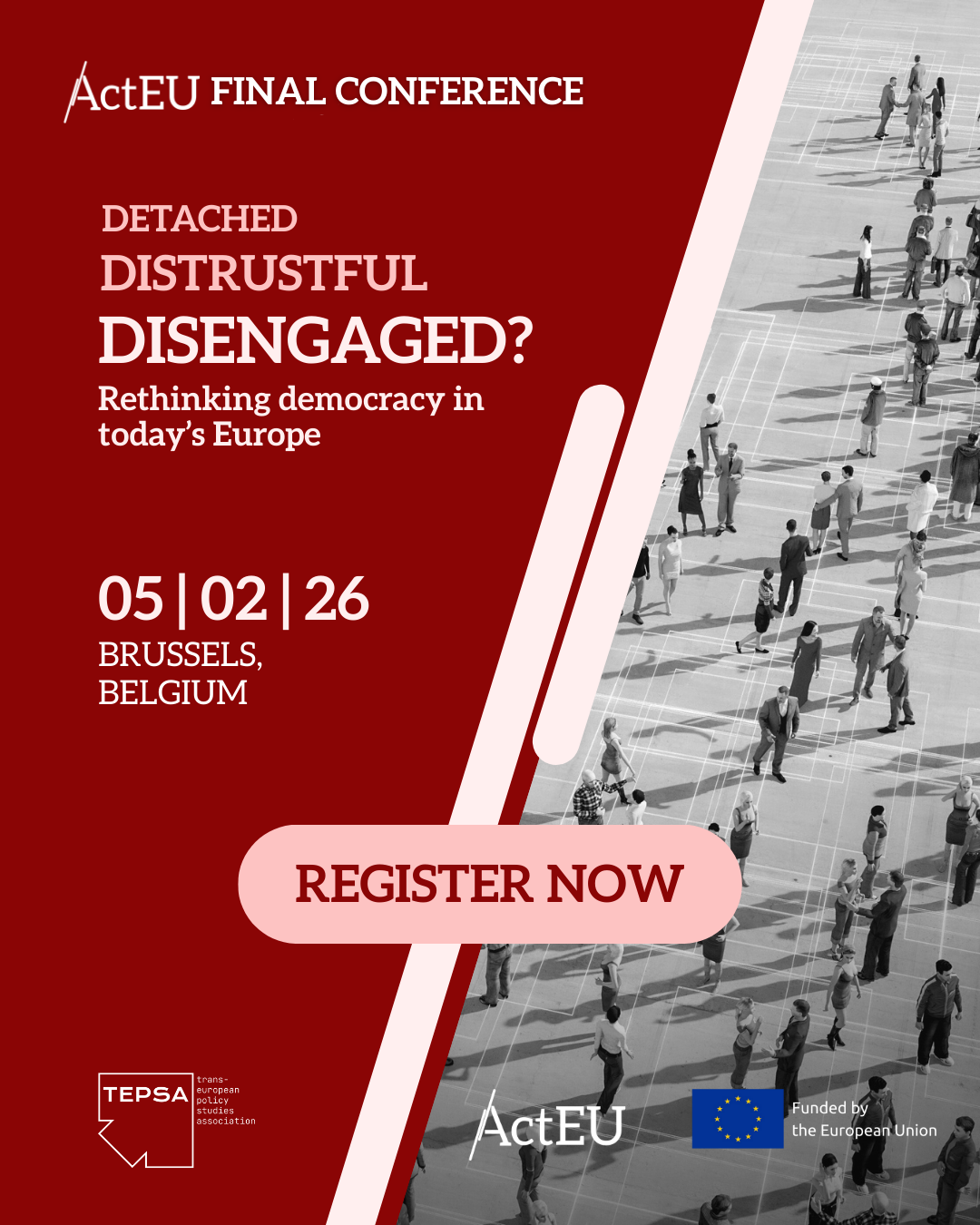
ActEU Final Conference on 5. February
Is political trust eroding under the pressure of crises and growing polarisation? Across Europe, citizens are confronted with intensifying divides over issues such as immigration, climate change, and gender equality. These divides increasingly shape political attitudes and behaviours, challenging the legitimacy of democratic institutions and weakening the foundations of representative democracy.
The Horizon Europe-funded project “ActEU – Activating European Citizens’ Trust in Times of Crises and Polarization” has been at the forefront of understanding how trust and legitimacy can be rebuilt in Europe’s multi-level democracies. By pioneering innovative methods to conceptualise and measure political trust – ranging from focus groups and experimental surveys to web scraping – ActEU has brought fresh insight into how polarization affects citizens’ perceptions of democracy, and what can be done to strengthen democratic resilience.
As this vital project enters its final phase, TEPSA warmly invites you to join its final conference: “Detached, distrustful, disengaged? Rethinking democracy in today’s Europe”. A forum to exchange narratives, spotlight innovative tools and methodologies, and advance actionable solutions to support the future of representative democracy in Europe.
We will bring together experts and practitioners to discuss these issues through a variety of panel discussions on 5 February 2026, at the Press Club Brussels Europe, Rue Froissart 95, 1040 Brussels.
Register now and join us for lively discussions with our diversified and interactive panels!

Untwist Work Package 2: Which are RWPP switcher voters gender-based needs?
We present the results of the second Work Package of the UNTWIST project:
There is little empirical evidence regarding how and why voters of traditional parties move to emerging right wing populist parties with discourses clearly opposed to gender equality. We explore the relation between gender and changing voting preferences. We carried on 18 Focus Groups in Spain, UK, Denmark, Germany, Switzerland and Hungary with voters of RWPP who has previously voted for traditional parties.

New publication: "Convergence, radicalisation, or ideological sorting? Exploring alignment patterns between radical and centre-right voters in Italy"
by Gianluca Piccolino, Giuseppe Carteny & Leonardo Puleo
Alliances between centre-right and radical right parties in Western Europe have elicited varied responses and strategic adaptations depending on the national context. In this respect, Italy presents a particularly distinctive case. Since the mid-1990s, a coalition between these parties has remained a stable feature of the Italian party system, winning the popular vote in five elections and forming a government on four occasions. Over time, the internal balance of power within the alliance has shifted significantly, with radical right parties now occupying a dominant position. This article examines the factors influencing electoral support for – and within – this coalition since 2001, with a specific focus on the role of anti-immigration attitudes and right-wing self-identification. Our findings reveal a growing explanatory power of anti-immigration sentiment in predicting support for the coalition. Unexpectedly, this trend first emerged in the mid-2000s and intensified markedly in 2022, when immigration-related concerns became a central driver of voting behaviour. Importantly, centre-right voters have not exhibited a corresponding rise in anti-immigration attitudes over time, suggesting that no ideological contagion from radical right parties has occurred within this segment. Instead, our results indicate that Italian populist right-wing voters have undergone a process of radicalisation, building upon a pre-existing reservoir of anti-immigration sentiment.
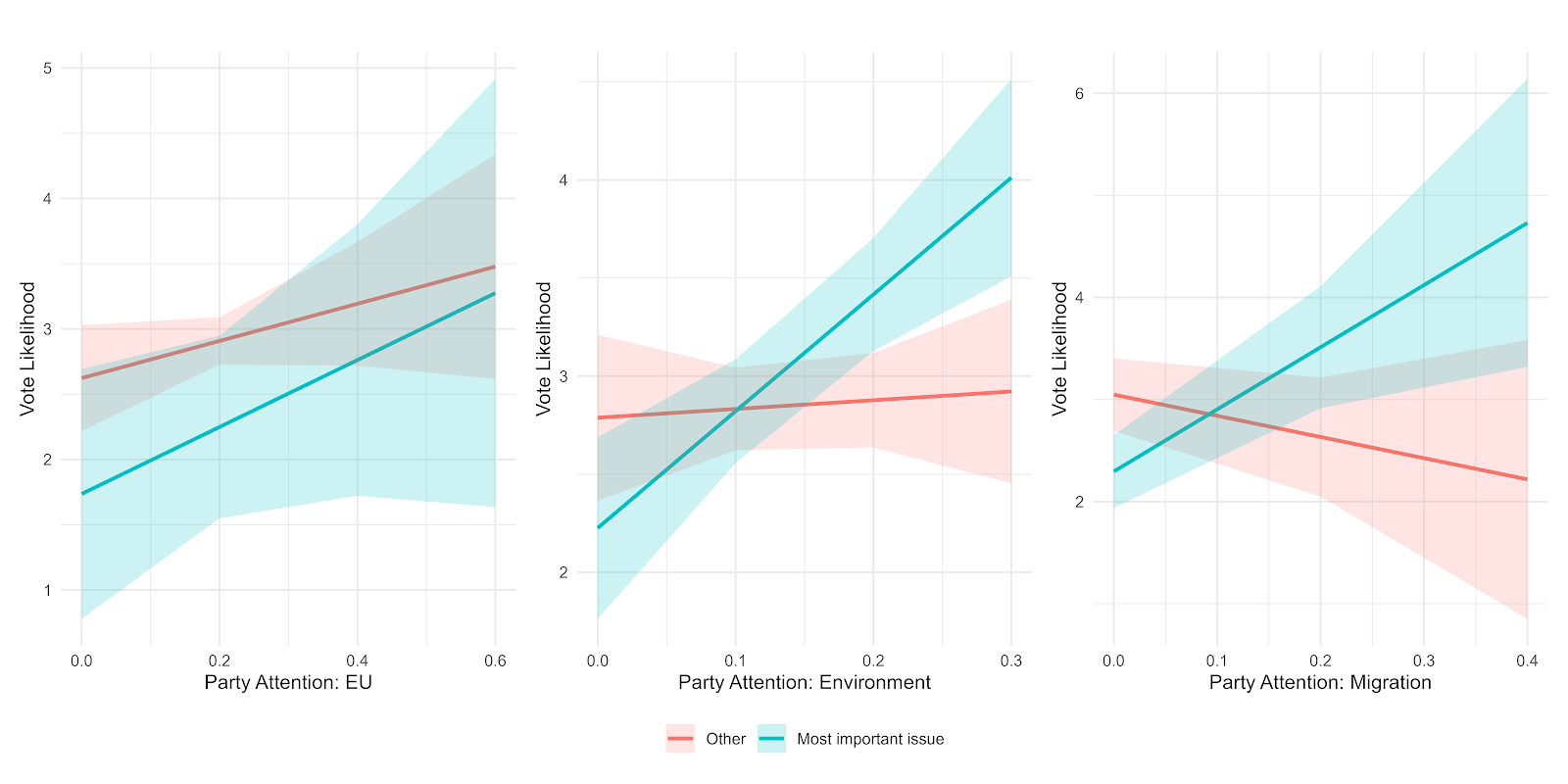
Blog post on the ActEU project: "Out of step? The EU's difficult election dance"
A blog post on the ActEU project has been published on the blog “The (European) Federalist”. The blog post reports on the results of the Horizon Europe project ActEU, which examines how well European parties reflect actual voter priorities in their election programmes. The analysis reveals clear discrepancies: parties often devote more space to issues such as defence or EU policy than the public wants, while many voters feel that more pressing issues such as migration or the economy are not given enough attention. The environment is the only area where party programmes and voter interests are reasonably aligned. These discrepancies can undermine trust and create space for more extreme actors who are more responsive to issues that matter to some voters.
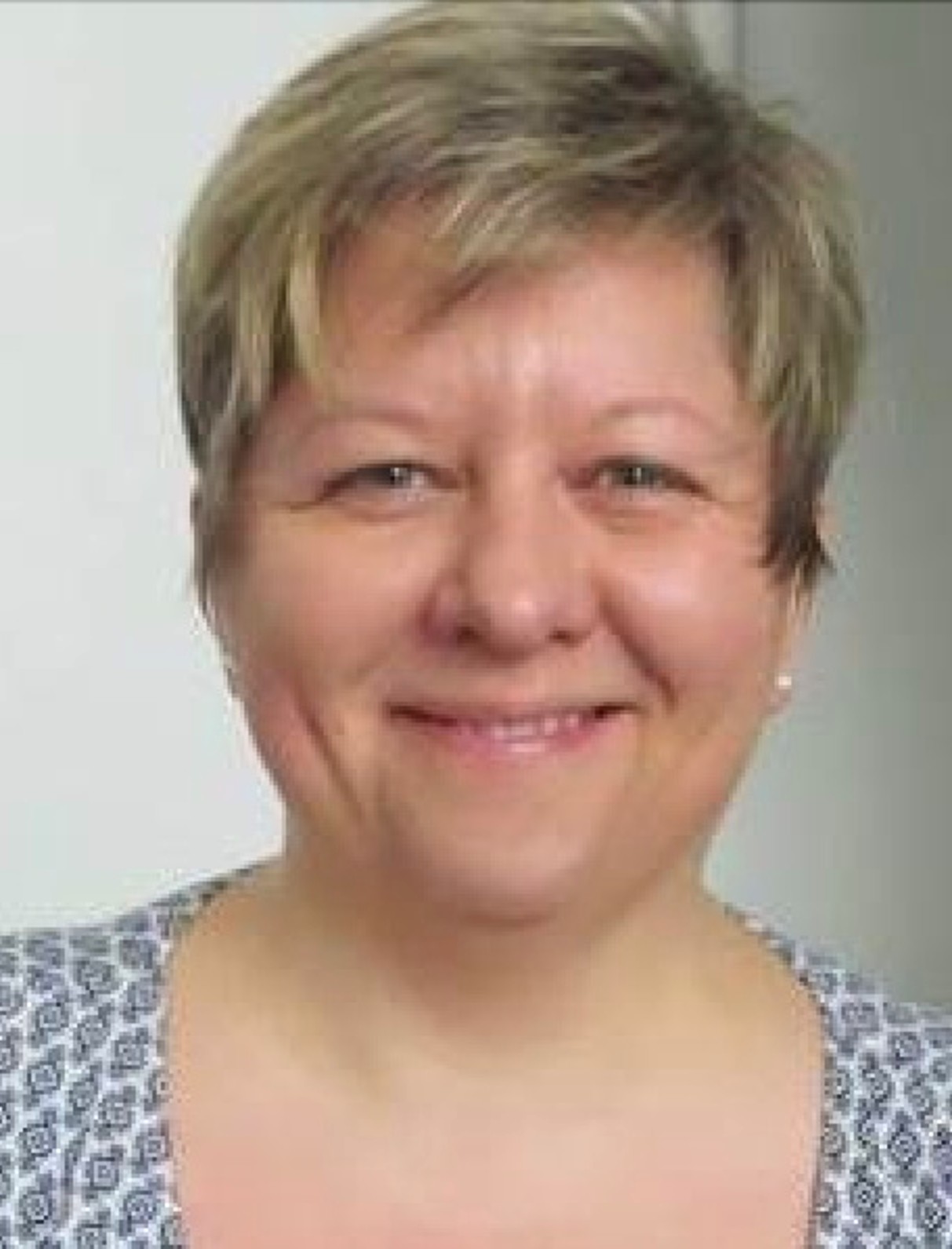
Talk by Dr Anne Jadot: "What drives French voters to the polls?"
Date: 13.01.2026
Time: 16:30-18:00
Place: Bld. B3 1, lecture hall I
Anne Jadot is a lecturer in political science at the University of Lorraine at the Institut de préparation à l'administration générale Nancy. Her lecture examines how different individual voter turnout – analysed using quantitative and qualitative data – explains key political dynamics and mobilisation patterns in France.

Job advertisement: Additional student assistant sought
The Chair of Political Science with a focus on European Integration and International Relations is seeking 1 research assistant for 10 hours per week starting on 15 February 2026 to support the research project “Total Annotation Variation”.
Tasks and activities:
- Systematic literature research: Identification, review and summarisation of scientific studies on: annotation, reliability and variation between annotators
- Support in the development of an annotation platform: assistance with simple programming tasks, interface checks and usability tests
- Data management and preparation: organising data sets, maintaining documentation, performing version control and creating descriptive summaries
- Supporting test runs: preparing annotation tasks, testing procedures, assisting with data quality monitoring
- General support for research in the fields of computer science and political text analysis
Requirements for applicants:
- Enrolled student at the University of Saarland
- Very good knowledge of English and German
- Good computer skills; experience with Python and/or R
- Experience in data processing
- Good knowledge of MS applications (including Word, Excel and Teams)
- Basic knowledge of and interest in topics such as annotation, natural language processing, text analysis
- Organisational skills, attention to detail and reliability
- Ability to work both independently and in a team
- Good communication skills
- Commitment and willingness to learn
Please send your CV and a letter of motivation in English (in one file) by email with the subject line “Application: Annotation Project” to Mr Giuseppe Carteny by 31 December 2025: Giuseppe.Carteny@uni.saarland.de

Job advertisement: Four new student assistants wanted
Tasks and activities:
- Supporting project management and procurement processes in the public sector
- Supporting political science research activities in the field of opinion polling
- Supporting data management and statistical analysis
Requirements for applicants:
- Enrolled student at the University of Saarland
- Very good written and spoken German
- Very good knowledge of English
- Knowledge of Turkish, Russian, Polish or Arabic is also advantageous
- Excellent organisational skills, focus on administrative tasks
- Good knowledge of MS applications (including Word, Excel and Teams)
- Good knowledge of data management and basic computer skills
- Knowledge of or interest in literature on experimental research design, political attitudes and political behaviour
- Good ability to work and communicate independently and in a team
- Reliability, commitment and willingness to learn
What we offer:
- Interesting insights into the field of political science research
- Teaching of research and investigation skills
- A friendly and motivated working environment
Please send your CV and a letter of motivation (in one file) by email to Mr Alexander Hartland: Alexander.Hartland(at)uni-saarland.de by 11 December 2025.

Job advertisement: Teamlead Data Development Pool SOUNDS (m/w/d)
The Societal Observatory Using Novel Data Sources (SOUNDS) is an interdisciplinary research project at Saarland University (UdS), funded by the state's transformation fund. It investigates societal transformation processes using innovative data sources such as satellite images, social media, and barcode scanners. The aim is to link computer science and social sciences and to strengthen the use of data-intensive methods. In the long term, the goal is to establish an institute based on the structures that have been developed. SOUNDS works closely with partners such as the I2SC (Interdisciplinary Institute for Societal Computing) and the Max Planck Institute for Software Systems. The project addresses disciplines such as political science, sociology, and macroeconomics and offers strategic interfaces to regional politics and economics. Cooperation with administrations should help to integrate scientific findings directly into decision-making processes. Many research projects are based on common data types such as social media data, mobility data, or satellite images. To promote efficiency, quality, and an open scientific culture, we are establishing a central technology and data pool, for which we are looking for a team lead as soon as possible who will supervise at least three data engineers.
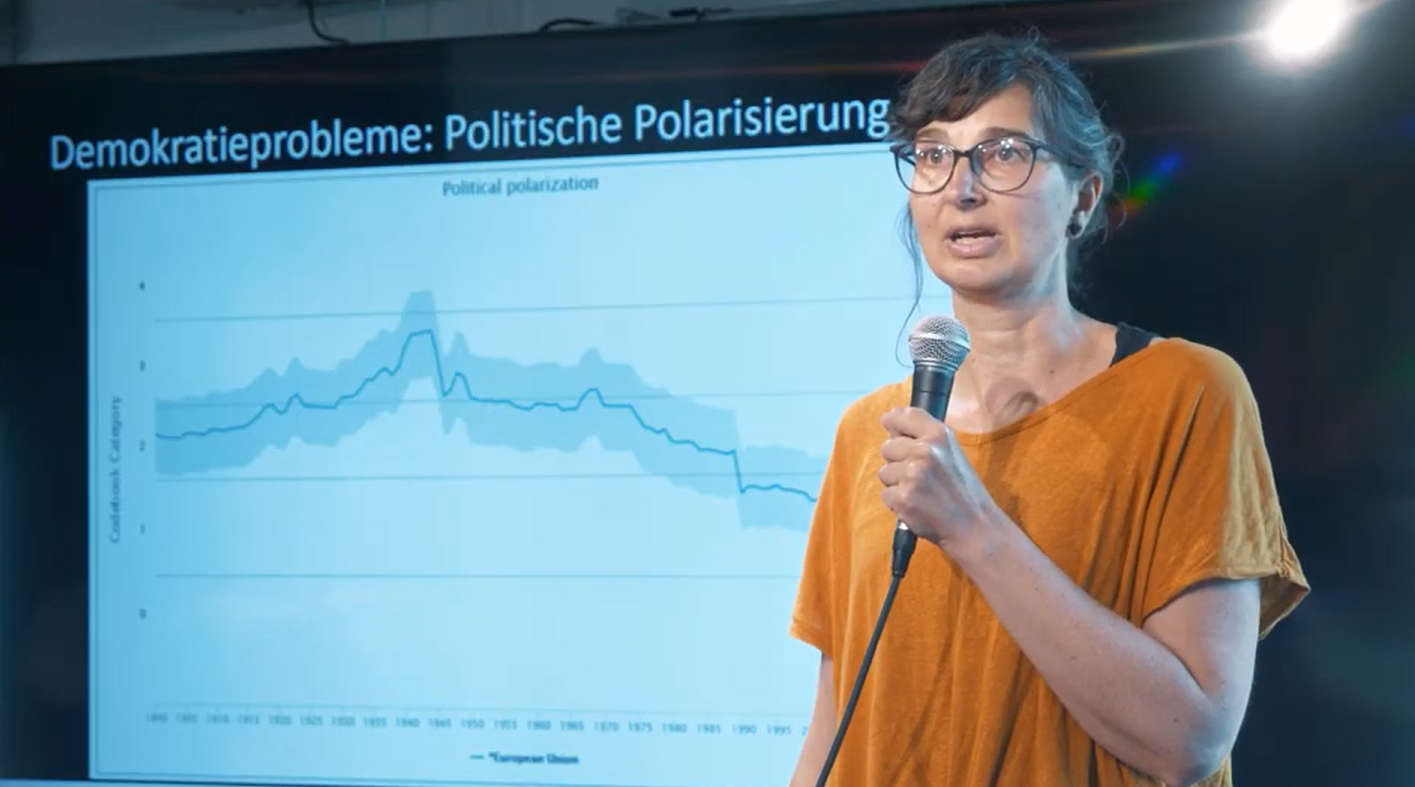
TEDx Talk by Prof Dr Daniela Braun: "How can we get more people involved in politics?"
In her talk at TEDx Saarbrigge, Prof Dr Daniela Braun highlights the current challenges facing democracies: declining voter turnout, growing polarisation and a loss of trust in political parties. She presents traditional approaches and innovative digital solutions – from citizens' assemblies to new communication formats – and calls for a collective rethinking of democracy. The recording of the talk is now available on the YouTube channel "TEDx Talks".

Lecture at the annual conference "Ten Years of Critical Security Studies" at Dresden Technical University
The annual conference of the Critical Security Studies thematic group took place on 6 and 7 November 2025 at TU Dresden, marking the group's tenth anniversary. Around 70 researchers discussed developments, perspectives and challenges in the field. The focus was on reflections on security discourses in the context of the war in Ukraine, the climate crisis and social polarisation. Several contributions emphasised the importance of power-critical, intersectional and interdisciplinary approaches. A roundtable with founding members took stock and outlined ways to strengthen institutional and international networking. The participants agreed to further expand the exchange between theory and practice.
Our chair also participated: Djamila Jabra gave a presentation in the panel “Climate security and speculative governance” entitled “Beyond Soft Power: Assessing the Salience of Climate Security in Political Parties in Europe”.
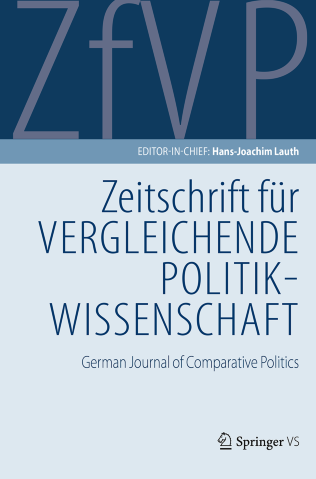
New publication: „Citizen’s trust and societal polarization in times of transformation“
The 2025 conference of the research section “Comparative Politics” of the German Political Science Association (DVPW) was dedicated to the topic: “Citizen’s Trust and Societal Polarization in Times of Transformation: Comparative Perspectives from Different World Regions.” Around 100 scholars from across Europe gathered from March 27 to 28 at Saarland University in Saarbrücken for the largest political science event to date hosted by the two political science chairs of the university’s still young department for European Social Research.
The conference is the result of two international research projects that are part of the Horizon Europe program: “Activating European Citizens Trust in Times of Crises and Polarization” (ActEU, led by the University of Duisburg-Essen and Saarland University) and PROTEMO (“Emotional dynamics of protective policies in an age of insecurity”, led by Saarland University). The aim of the conference was to address and discuss the most pressing challenges facing representative democracy across 20 panels: citizens’ trust—or distrust—in “their” political system, institutions, political representatives, and the EU as well as the interrelationships between trust, emotions and societal polarization. These overall topics are linked to long-term transformations related to migration and integration, climate change, technological change, gender inequalities, Europeanisation or region-specific challenges.

Bachelor's degree in European Studies – over 60 students begin their studies
66 new students began their Bachelor's degree in European Studies at Saarland University in the winter semester 2025/26 and were welcomed on 10 October 2025 with a Welcome Day organised by the study coordinators and the European Studies student council.
The first-year students are distributed across the four specialisations offered as follows: 19 students in Geographies of Europe, 15 students in Modern History, 27 students in Politics, Law and Society, and five students in Comparative Literature. In addition, five junior students are getting a taste of university life during the winter semester while still at school, attending lectures and seminars. A total of 168 students are currently enrolled in the Bachelor's programme in European Studies. In addition, there are 23 students from the German-French programme in European and International Politics who began their second year of study in Saarbrücken in the winter semester 25/26 and who also took part in the European Studies Welcome Day.

Gender Politics in Germany: Evidence and Recommendations from the UNTWIST EU Horizon Project
As part of the UNTWIST project, Prof. Dr. Daniela Braun, Chair of Political Science with a focus on European Integration and International Relations at Saarland University (UdS), and Dr. Giuseppe Carteny, research assistant specialising in political behaviour, party politics and quantitative methods at UdS, will present their key findings and results at the online event ‘Gender Politics in Germany: Evidence and Recommendations from the UNTWIST EU Horizon Project’ on 9 November.
The contents at a glance:
- Gender politics in Germany
- Polarisation between parties
- Citizens' perspectives on equality and care
- Policy recommendations
Please register – with specific questions if you wish – by 21 November 2025 at: Vinciane.Pilz@uni-saarland.de
After registering, you will be sent a link to participate.
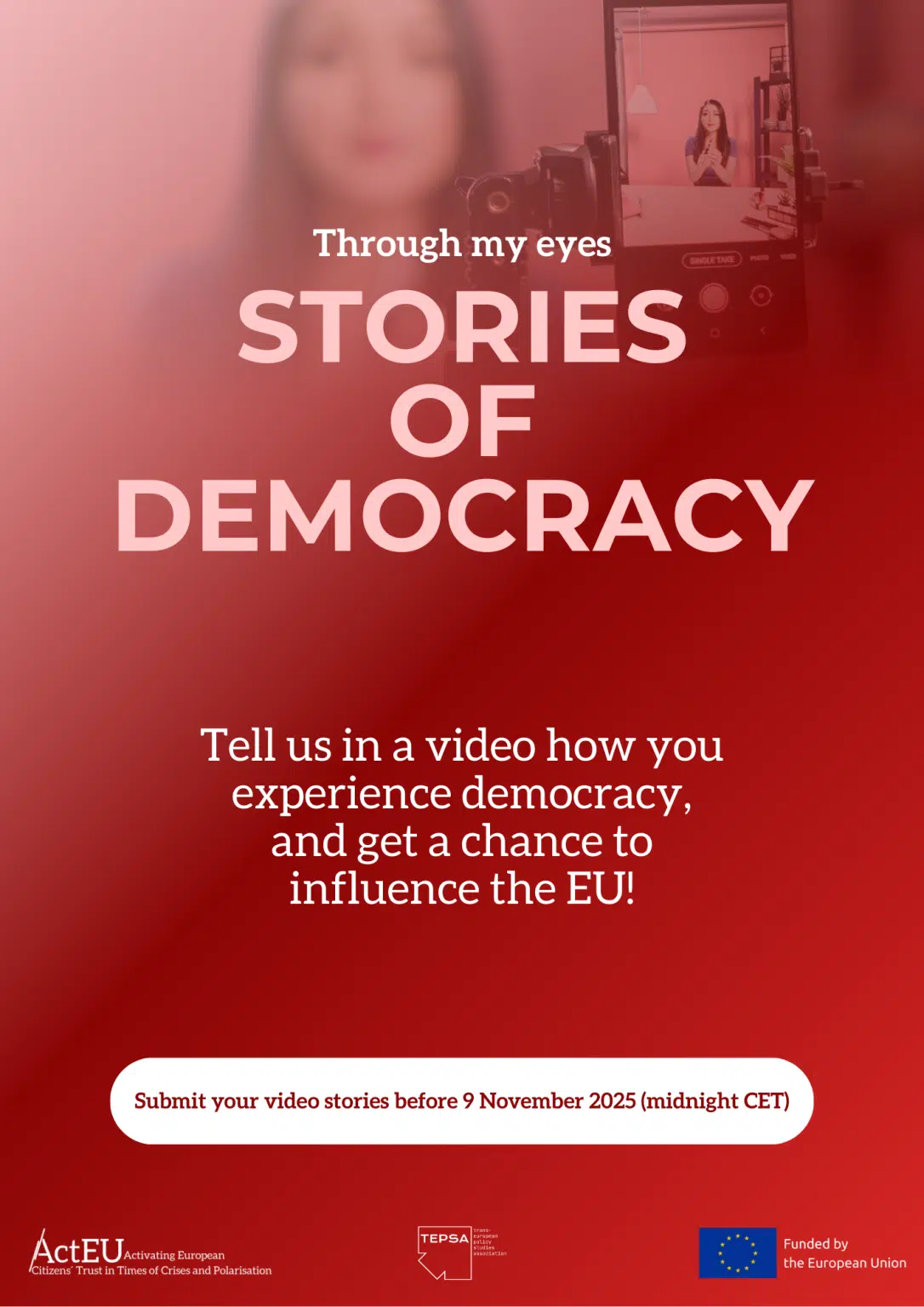
ActEU video competition offers trip to Brussels as prize
What does democracy look like to you? Is it electing your representatives and trusting them to make decisions that benefit the general interests? Is it feeling part of a society and of the decisions that affect you? Or is it about fighting for your struggles: for change, for being heard, having your voice matter?
In a time of political division, polarised debates and declining trust, democracy can feel distant, though it remains deeply personal. Because behind every headline, statistic or political statement, there are real human stories. With this video contest TEPSA invites you to share your perspectives and have your voice amplified across Europe.
Video entries of up to three minutes in length that creatively address this question can be submitted until 9 November. The winning video will be rewarded with a trip to Brussels to attend the ActEU final conference.
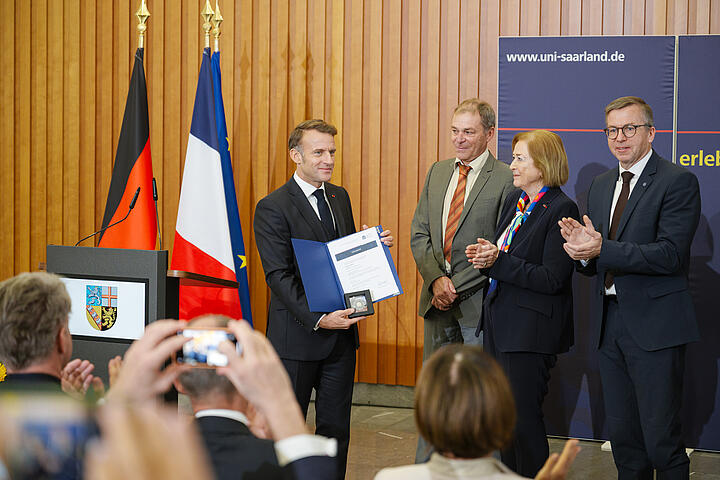
French President Emmanuel Macron awarded honorary doctorate by Saarland University
French President Emmanuel Macron has been awarded an honorary doctorate by the Faculty of Human and Business Sciences at Saarland University in recognition of his exceptional contributions to European higher education and to scientific and academic cooperation. The award ceremony took place in Saarbrücken on 3 October as part of the German Unity Day celebrations.
In its official statement, the university describes the French head of state as a 'political trailblazer whose ideas and initiatives have laid the groundwork for a new generation of European universities'. French President Emmanuel Macron has played a pivotal role in shaping European science and higher education policies. His landmark speech at the Sorbonne on 26 September 2017 stands out as a defining moment, in which he set out a bold agenda for a new European education area.
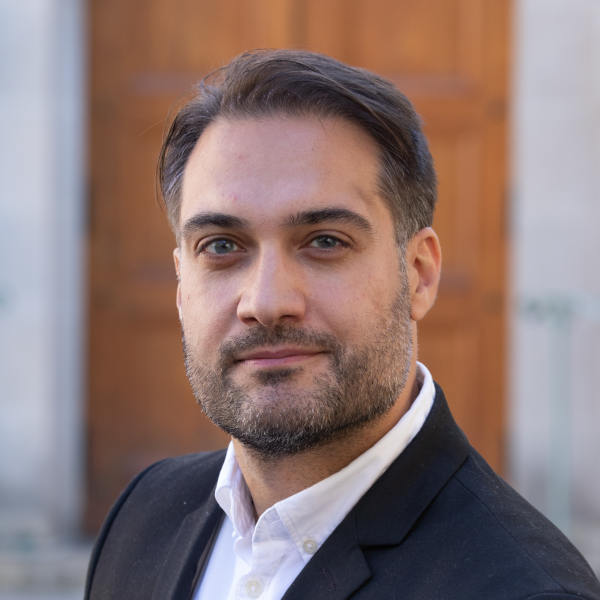
Date: 04.11.2025
Time: 16:30-18:00 Uhr
Place: Geb. B3 1, Hörsaal I
Pascal König is an assistant professor of public administration at the Department of Political Science and Public Administration at Vrije Universiteit Amsterdam. In his lecture as part of the lecture series Politics in Europe, he explains how cultural values and political ideologies are embedded in AI systems, creating new tensions between society, politics and technology.

Interdisciplinary lecture series "European Transformations" in the winter semester
The winter semester 2025/26 will see the launch of the “European Transformations” lecture series, organised by junior professor Dr Carole Fricke as part of the Master's programme Spaces, Politics and Societies of Europe. The interdisciplinary lectures will be given by lecturers from the Department of European Social Studies. The European Transformation lecture series deals with the dynamic and multifaceted transformation processes that are shaping contemporary European society, spatial planning and politics. It offers a comprehensive overview of current changes and addresses critical issues such as polarisation, populism, digitalisation, questions of (in)security, urbanisation and conflicts over space and resources. The lecture series not only addresses changes in European politics and society in general, but also offers detailed insights into spatial changes within European cities and border regions. Each lecture focuses on a selected topic or concept, drawing on both subject-specific debates and interdisciplinary discourses in/about Europe.
As part of the lecture series, Dr Giuseppe Carteny will give a lecture entitled „The politicisation of gender in contemporary European politics“. This lecture examines the contemporary politicisation of gender in European politics, highlighting the significant increase in the prominence of gender-related issues in public discourse, electoral competition, and policy debates. Drawing principally on empirical contributions, the seminar will survey recent findings from studies of public opinion, voting and party politics. We will pay particular attention to the mechanisms linking changing attitudes to political behaviour, including turnout and vote choice, and to the ways in which political parties shape, respond to and strategically frame gender claims. The contemporary features of this politicisation will be emphasised, including multidimensionality, salience and polarisation, while considering intersectionality and transnational diffusion — or lack thereof. The lecture aims to provide students with the analytical tools necessary to assess the circumstances in which gender becomes politicised, the parties that benefit or lose out in this process, and its consequences for democratic representation and public policy in Europe.
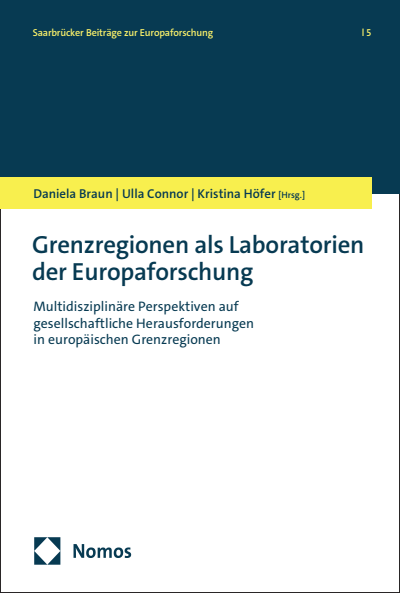
Now six volumes long: Saarbrücken Contributions to European Studies
The Saarbrücker Beiträge zur Europaforschung (Saarbrücken Contributions to European Studies) bring together current academic findings from European studies historically anchored at Saarland University. The publication series of the Cluster for European Studies at Saarland University CEUS, in which the internationally renowned European expertise of Saarland University works together on an interdisciplinary basis, offers perspectives on current topics in European studies from the fields of humanities, literature, cultural studies, linguistics, social sciences, spatial studies and law in the form of anthologies and monographs. In this way, it is also a reflection of the CEUS's powerful formats and the excellent promotion of young researchers.

Job advertisement: Student assistant wanted
We are looking for a student/research assistant for the large-scale SOUNDS project!
- The tasks involve supporting project management in various organisational and administrative processes. For example:
- Supporting internal and external communication (e.g. website content, social media).
- Assisting with the creation of texts.
- Proofreading texts and presentations.
- Supporting the preparation, organisation and supervision of events, appointments, meetings and workshops.
- Conducting research.
- Supporting data management and analysis (no prior knowledge required).

Job advertisement: Project manager wanted
As part of the newly established interdisciplinary competence centre SOUNDS (Societal Observatory Using Novel Data Sources) at Saarland University, the following position is advertised with an application deadline of 10 October 2025:
Management of the large-scale SOUNDS project
In addition, further complementary positions as consultants and in the field of data engineering are planned in the near future, as well as a graduate college and the advertisement of new professorships in the field of computational social sciences.
We would be delighted if you could forward this advertisement to anyone who might be interested.

New publication: "Party competition on European issues in the 2024 EP elections"
by Giuseppe Carteny, Daniela Braun, Alex Hartland & Ann-Kathrin Reinl
Recent developments have turned European integration from a “sleeping giant” into an active political issue. The Maastricht Treaty politicized Europe in national and European Parliament elections. Cross-border crises, like migration and environmental challenges, have further increased the importance of coordinated EU responses. Moreover, an entirely new family of Eurosceptic parties has emerged and consolidated over the past decade. Given that one of their main aims is to challenge and criticise the European Union (EU), Eurosceptic parties have a particular interest in European issues - the European polity as well as major European policies. Against this background, this paper examines whether and how political parties have emphasised these issues during the 2024 EP elections, compared to 2019, and contrasting Eurosceptic and mainstream parties. Drawing on annotated data from the 2019 Euromanifesto project, we fine-tune transformer-based deep learning multilingual models to detect parties' salience and positions on European polity and policy issues in nine countries during the 2024 EP elections. Our analyses show that the salience of European issues has increased on average, in particular for the EU polity. In terms of positions, we detect a pattern of increasing negativity of mainstream parties on European policy issues, such as migration and the environment, whereas Eurosceptic parties (in particular of the far-right) appear to have become less negative on the EU. In sum, our results suggest an increasing relevance of EU-wide issues, with different patterns of polarisation.

Enrolment in the Bachelor's programme in European Studies still possible
Prospective students can still enrol for the Bachelor's degree programme in European Studies until 30 September. This applies to the following specialisations: Geographies of Europe, Modern History and Comparative Literature. Enrolment takes place via the Saarland University online application portal for admission-free degree programmes.
In the 2025/26 winter semester, two block seminars in English and French will also be held for international students. The seminars are aimed at Erasmus incoming students and focus on European culture, intercultural communication and multilingualism. The courses will take place before the start of lectures, from 2 to 10 October 2025. Registration is possible via an online form and is open until the beginning of October.
Further information on the European Studies programme
Further information on the block seminar

New publication: "Political parties’ policy preferences on environmental issues in German border regions"
by Daniela Braun, Giuseppe Carteny, Alex Hartland, Djamila Jabra & Rosa Navarrete
Cross-border cooperation is an increasingly important issue in the EU, but little is known about its influence on domestic politics in EU member states. Previous studies suggest that border regions can influence political attitudes and party positions, but systematic analysis of these variations is lacking. We use Local Manifestos Project texts to measure the environ‐mental policy positions of political parties by location in Germany. By comparing the distance from the border of each locally-based party with the position expressed in their manifesto, we could identify any systemat‐ic variation in position relative to border proximity. We found minimal variation within parties regarding salience and position on environmental issues, suggesting that local branches of major parties tend to adopt similar strategies, possibly not adjusting the content of their electoral proposals to meet the specific demands of their constituents.
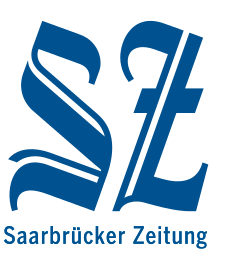
Saarbrücker Zeitung reports on SOUNDS
Data has long since become the new currency: every day, we hand it over to tech giants such as Amazon, Google, Meta & Co, thereby cementing their market power and influence. Year after year, data trading generates revenues in the trillions. And as if that weren't enough, the hoarded data is used to create highly intimate user profiles, which algorithms then use to provide us with tailor-made advertising and news. The closed loop is complete – in other words, the bubbles in which we live.
A new centre of excellence is now being established at Saarland University, which aims to become Germany's leading point of contact for social science analyses of digital data in the medium term. The project is called "SOUNDS" (Societal Observatory Using Novel Data Sources) and will be funded with 29 million euros over seven years from the state government's transformation fund. It was presented on Friday in the presence of Science Minister Jakob von Weizsäcker (SPD). He sees ‘enormous potential for the economy and the public sector’.

New publication: "Who engages with environmental issues in a multi-level system? An exploratory analysis of German parties’ issue emphasis"
by Daniela Braun & Martin Gross
Environmental policies are central to contemporary politics. Consequently, parties are incentivized to shape public discourse on environmental issues – a tendency particularly pronounced for left-wing parties. Within the European Union’s (EU) multi-level political system, this is a complex undertaking, as environmental policies are frequently decided and implemented across various political tiers. Utilizing a newly developed dictionary focused on environmental issues, we examine German parties’ emphasis on these issues in EU, federal, regional, and local election manifestos from 1989 to 2021. Our findings indicate that parties’ strategic considerations are the primary factors correlating with variations in their environmental issue emphasis across political levels. Particularly non-left-wing parties place less emphasis on environmental issues when facing electoral competition from successful Green parties at the same political level. Moreover, left-wing parties have a stronger incentive to emphasize environmental policies, including explicit state interventions. Yet, this electoral challenge is significant only within the same political level and not across different levels. Furthermore, the economic context in which parties compete is crucial: they tend to place greater emphasis on environmental issues when economic conditions are more favorable.

New publication: "Euroskeptizismus in der deutsch-französischen Grenzregion. Eine Tageszeitungsanalyse zu den Kommunalwahlkämpfen in Saarbrücken und Forbach"
by Daniela Braun & Friederike Hommel
This article examines the observation that approval ratings for the Eurosceptic party Rassemblement National are high in the German-French border region, especially on the French side. EU border regions are often seen as prime examples of European integration. However, this can manifest itself in two ways, as both the advantages and disadvantages of the border location are clearly felt here. A qualitative content analysis was used to examine whether and in what form Euroscepticism is expressed at the local political level in the reporting on the mayoral elections in the two border towns of Forbach and Saarbrücken. The results show that, at least in the two selected border towns, Euroscepticism did not play a decisive role in the local election campaign and that European and border region issues were generally not particularly visible. In this respect, the findings of the study offer many possible starting points for further research to better understand European border regions.
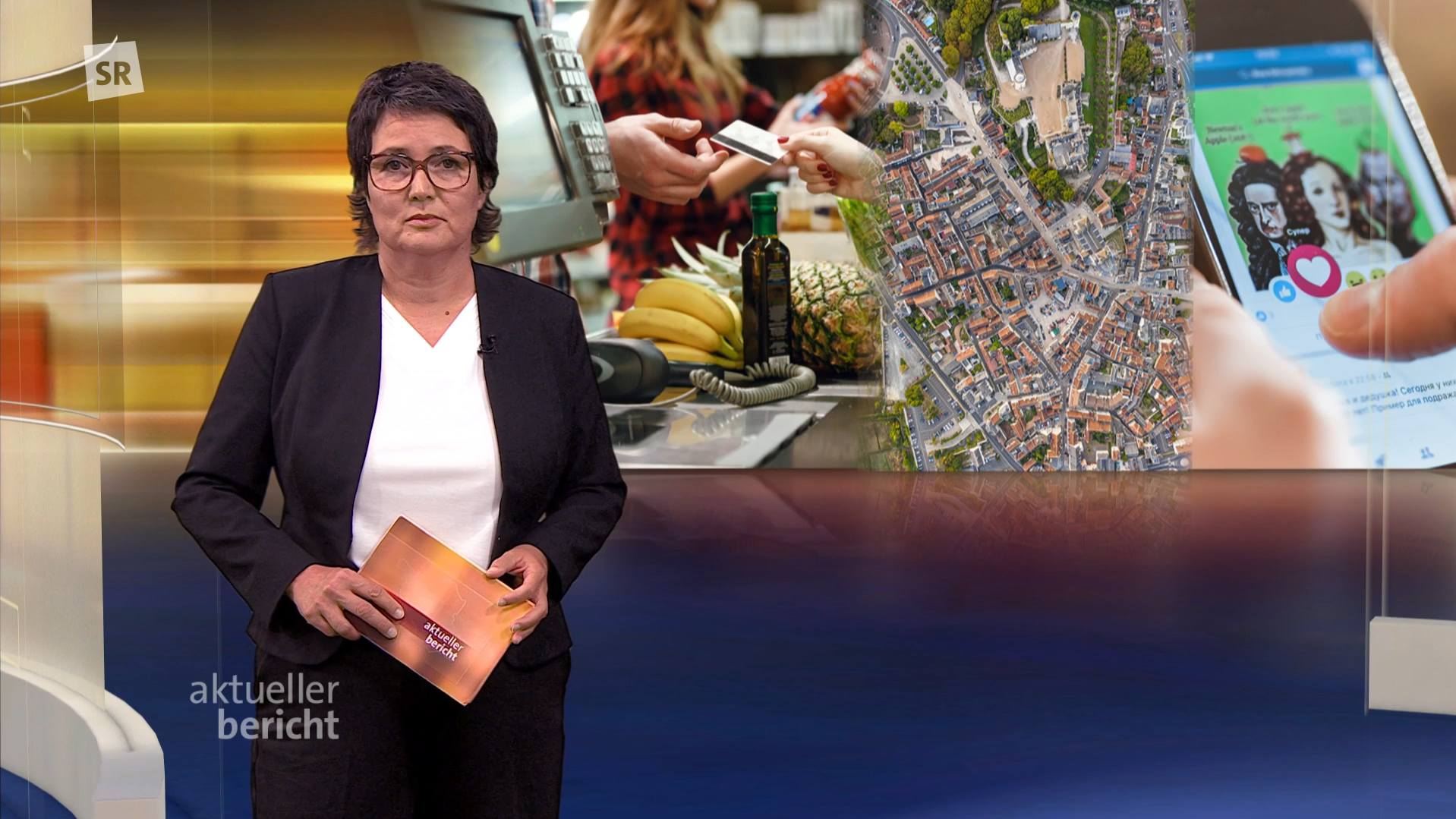
SR reports on SOUNDS
In its latest report, Saarländischer Rundfunk (SR) covers the SOUNDS project at Saarland University, which is dedicated to evaluating unconventional data such as social media analyses, satellite images and web search trends. SR interviewed political scientist Prof. Dr. Daniela Braun and computer scientist Prof. Dr. Ingmar Weber about the project. By combining the expertise of Saarland University in the field of computer science with findings from social science research, SOUNDS aims to become a central hub for innovative, empirical studies addressing current social challenges. Ultimately, SOUNDS aims to inform decision-making processes, promote public engagement and support democratic resilience, thereby positioning itself both as a research centre and as a think-and-do tank dedicated to solving real social problems.

Millions in state funding: analysing society and the economy with new data sources
Satellite images, social media and barcode scanners in shops offer a wealth of data that has so far been little used in the social sciences. New AI-supported methods are helping with the evaluation of this data, but they require a great deal of IT expertise and legal and ethical classification. This interdisciplinary expertise is now to be pooled in a competence centre called "Societal Observatory Using Novel Data Sources (SOUNDS)".
The state government is supporting this with 29 million euros from the Transformation Fund in order to generate not only scientific insights but also concrete economic impetus for the transformation of the Saarland economy.

New publication: "Is secular–religious party competition moving online? Digital religious profiles of candidates running for the European Parliament"
by Eva-Maria Euchner, David Schweizer & Daniela Braun
New digital technologies alter various societal spheres, including the landscape of religion and politics. “Christianity influencers,” faith tweets, digital chaplaincy and online Islamic hate speech are notable examples in place. The rapidly growing body of scholarship known as digital religion studies explores the extent to which traditional religious practices are being adapted to digital environments. However, while this nascent field profits from interdisciplinary perspectives, the political dimension of this transformation is still underdeveloped. Specifically, it is unclear how political actors refer to religion during online campaigning across Europe and whether the existing patterns reflect “classical offline divides” between secular and religious parties. This paper contributes to this gap by providing first-hand empirical evidence of online references to religion by candidates running for the European Parliament in 2019 in four countries (Germany, Sweden, the Netherlands and the United Kingdom). The study uses a mixed-methods approach, combining qualitative and quantitative analyses of European politicians’ X (formerly Twitter) profiles. Overall, religion plays a subordinate role in online political campaigning; however, there is substantial country variation, indicating a higher salience of religion in Swedish and Dutch campaigns in comparison to German or British online discourses. Furthermore, candidates from political parties with religious roots are more likely to refer to religion than those from more secular parties, reflecting traditional secular-religious divisions. The paper advances existing research on religion and party politics through its fresh perspective on religion outside classical arenas of political conflict and inside important alternative venues of political competition.
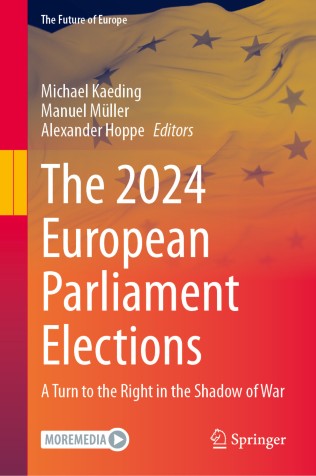
New publication: "Climate Change and Political Parties: Higher Salience and More Diversification Over Climate Change in the 2024 EP Elections?"
by Daniela Braun, Djamila Jabra und Jan Pollex
The EU faced several crises during the Parliament’s last term, notably the Covid-19 pandemic and Russia’s invasion of Ukraine. However, advanced by the new Commission President von der Leyen and her European Green Deal, one of the major issues the Parliament was supposed to tackle was the climate crisis and the transition to climate neutrality. In line with the European Green Deal, the European Commission indeed prioritised mitigating climate change as part of the European agenda after the 2019 EP elections. However, in the later period of the legislature, farmers’ protests across Europe encouraged in particular conservative political parties to challenge this European Green Deal. Against this background, we expected that the issue of how best to combat climate change would be widely debated in campaigns for the 2024 EP elections. Therefore, based on manifesto data from the main transnational party federations, we empirically study (using a mixed-methods approach) both the salience and framing of policies covering climate change-related issues in the 2024 EP election campaign. Our findings suggest that in these elections there is some evidence for a “greening” of Europarties: climate policy is more salient and parties engage intensively with the issue. However, marked differences regarding the importance accorded to climate policy emerge along a left-right divide. This is in line with much of the current research on partisan politics.
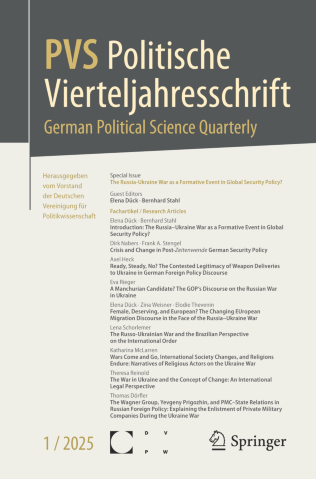
New publication: "Crises, Adaptation, and Resilience—Exploring Crises Responses of Regional Organizations from the Perspective of EU Studies and Comparative Regionalism"
by Alexander Libman, Lisa Anders & Daniela Braun
How do different types of regional organizations react to current challenges and crises? This special issue of the Politische Vierteljahresschrift explores this question by bringing together contributions from European Union studies and comparative regionalism. This introduction discusses the concepts of crisis, adaptation, and resilience as well as the value of the dialogue between the two subdisciplines, outlines the aims of the special issue, systematizes the main findings of the contributions, and reflects on their implications for future research.

Science communication officer wanted at CEUS
The Cluster for European Studies CEUS is looking for a Science Communication Officer to start as soon as possible. Detailed online applications (in a single PDF file) can be sent to bewerbung@uni-saarland.de until 27 August 2025. Please include the reference number N2180 in the subject line of your email.
The Cluster for European Studies CEUS, newly established in 2020, is a central academic institution at Saarland University. As a platform and centre of excellence, it brings together initiatives and projects in interdisciplinary European studies and other activities in the university's historically established focus on Europe. Its task is to establish and provide scientific support for knowledge transfer, to communicate the results of local European research and the expertise of its members to the public, to facilitate knowledge transfer through public formats and publications, and to raise the university's profile as a beacon of (inter)national European research.
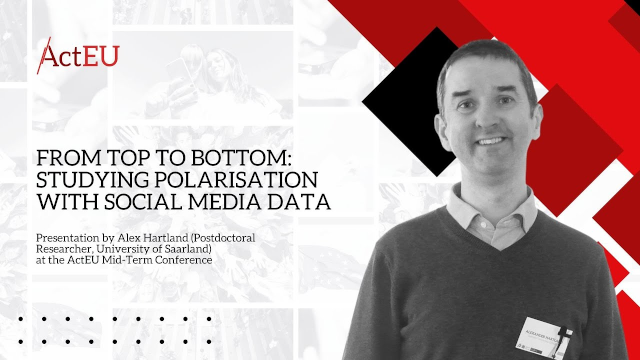
Alex Hartland: Studying polarisation with social media data
At the end of last year, the Trans European Policy Studies Association (TEPSA) organised the mid-term conference of the Horizon Europe project ActEU in Brussels. This academic conference, titled “Strengthening democracy: Building trust and tackling polarisation in Europe”, brought together researchers, policy-makers, and practitioners to assess the project’s key challenges and successes.
Dr Alex Hartland gave a lecture here on the study of polarisation based on data from social media and also discussed specific examples from Germany. TEPSA has now made a recording of the lecture available on YouTube.

Special Issue Workshop at Saarland University
On 17 and 18 July 2025, an international and interdisciplinary workshop funded by the Internationalisation Fund took place at Saarland University. The aim of this joint workshop was to publish a special issue (SI) in the renowned political science journal European Political Science Review. The initiators of this project are Prof. Dr. Daniela Braun from the Chair of Political Science with a focus on European Integration and International Relations in the newly established Department of Social Sciences European Studies, and Luca Carrieri and Nicolò Conti from Unitelma Sapienza University Rome. The idea for this SI was inspired by various ongoing or already completed projects based at Saarland University. Firstly, the ProConEU project (funding code 01UG2104B), which is funded by the German Federal Ministry of Education and Research and led by Daniela Braun. Several researchers involved in this SI (Daniela Braun, Giuseppe Carteny, Leonardo Puleo, Hermann Schmitt) collaborated on this project. Secondly, ActEU, a currently ongoing Horizon Europe project led by Daniela Braun and Michael Kaeding (UDE). Here, too, a number of researchers involved in this SI are participating (Daniela Braun, Giuseppe Carteny, Matilde Ceron, Alex Hartland, Zoe Lefkofridi, Rosa Navarrete, Ann-Kathrin Reinl). Thirdly, the articles in this SI present the results of a project funded by the Italian Ministry of University and Research (PRIN 2022 ‘Whither Sovereignty?’).
The workshop offered the researchers involved in the publication an intensive opportunity for exchange and collaboration with various intra- and international research groups in the fields of political science, social science and European studies.
1. It enabled and promoted new networking between the University of Saarland and other institutions and researchers working on the same topics.
2. The central goal of the workshop was achieved and is expected to be published in the second half of 2026 in the renowned journal European Political Science Review as a joint, interdisciplinary and international contribution to the latest state of research.
3. As an additional result, this fruitful meeting gave rise to a new project idea, which is to be finalised in the near future.
The opportunity for this close exchange between Prof. Dr. Daniela Braun's political science chair and the visiting guests has thus proved conducive to laying the foundation for international cooperation between the University of Saarland and other institutes worldwide and can be regarded as a complete success.

Throwback: "Democracy in the digital age: ideas that shape our future"
At TEDx Saarbrigge, we turned things upside down and reimagined democracy in the digital age: On 14 June 2025, under the motto ‘Democracy in the digital age: Ideas that shape our future,’ committed voices from civil society, academia and activism came together at the CoHub on Saarbrücken's Neumarkt.
The event was organised by Prof. Dr. Ingmar Weber from the Interdisciplinary Institute for Societal Computing at Saarland University together with Dr. Kevin Baum from the German Research Centre for Artificial Intelligence (DFKI) and other partners. Prof. Dr. Daniela Braun participated as a speaker.
We were delighted with the lively participation and the many ideas that were generated.
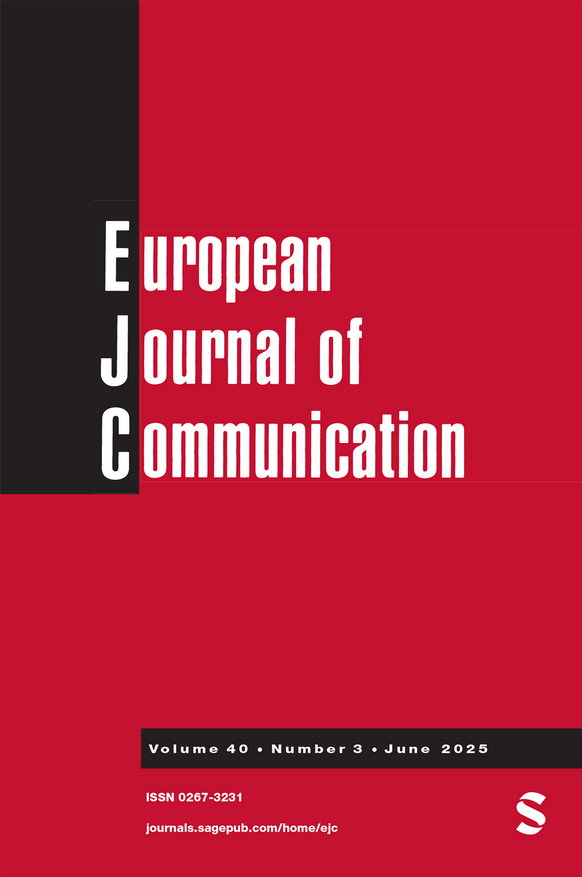
New publication: "Anti-feminism in the spotlight: Media coverage of German parties’ gender and sexuality policies in the 2024 European Parliament election campaign"
by Louise Luxton, Djamila Jabra and Daniela Braun
Abstract: Right-wing populist parties (RWPPs) across Europe are increasingly politicising anti-feminist positions on gender and sexuality issues. However, little is known about how this mobilisation translates into media coverage. We argue that RWPPs’ polarising positions appeal to news values like conflict and sensationalism, leading to greater visibility, particularly compared to traditional issue owners that promote gender equality. We conduct a quantitative content analysis of party manifestos and six months of newspaper coverage during the 2024 European Parliament elections in Germany to examine whether media attention on gender issues corresponds with parties’ manifesto emphasis and whether the RWPP Alternative für Deutschland (AfD) is disproportionately visible. Our findings show that the AfD promoted distinctly negative gender positions and received more gender-related coverage than any other party. While mostly negative in tone, this coverage amplifies the party's anti-feminist discourse, with broader implications for gender equality and the role of news media in democratic societies.
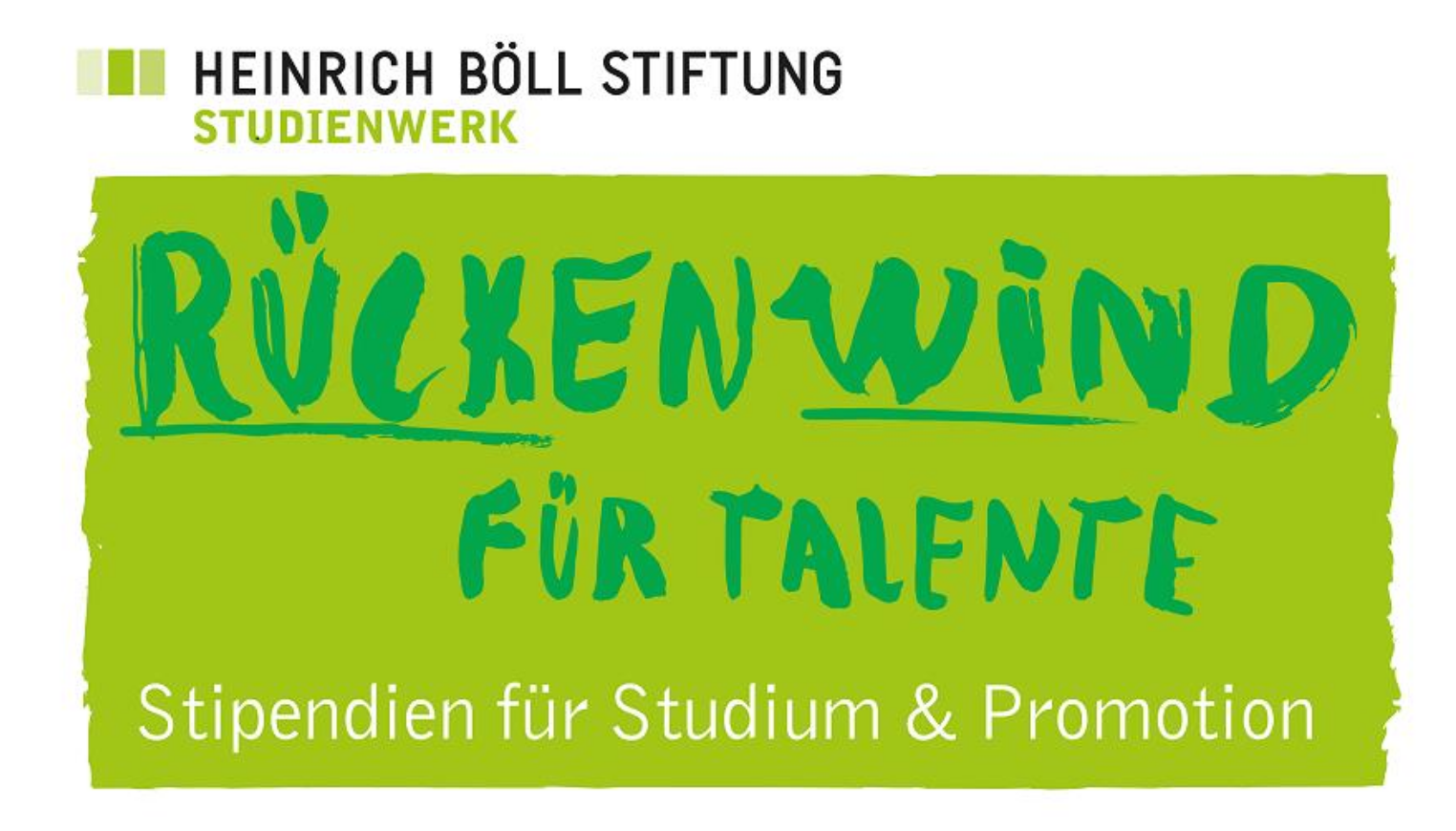
Digital information event on doctoral scholarships from the Heinrich Böll Foundation
14 July 2025
17:00 - 18:30
The Heinrich Böll Foundation awards scholarships for students and doctoral candidates. Scholarship holders receive both financial and non-material support in the form of events for political education and personal qualification as well as offers for networking and career entry. The foundation supports scholarship holders with particularly good academic or scientific achievements, who are socially committed and have an interest in politics. But what exactly does this mean and how do applicants present this convincingly in their application? Does your profile match the foundation, who exactly are we looking for?
At the information event, the foundation will provide information about the objectives of its doctoral funding programme, the selection criteria, the formal requirements for a doctoral scholarship, the expectations of applicants, the application documents to be submitted and the selection process, and will answer any open questions.
Regristration for the event
Info poster (German)

Publication: "Border regions as laboratories for European research"
by Daniela Braun, Ulla Connor & Kristina Höfer (eds.)
This interdisciplinary volume offers insights into the social challenges of European border regions. It centres on the question of what contribution the study of border regions makes to European research. The volume includes historical analyses as well as studies of current social, cultural, legal and political opportunities and challenges of European border regions. Case studies from different contexts analyse the political attitudes of political parties and the population, shed light on the consequences of deindustrialisation in border regions and examine cross-border cooperation in areas such as mobility, infrastructure, education and legal issues.
With contributions by Daniela Braun | Dominik Brodowski | Giuseppe Carteny | Julia Dittel | Stefan Ewert | Carola Fricke | Friederike Hommel | Ines Funk | Philip Hahn | Alex Hartland | Djamila Jabra | Alexander Kratz | Fabian Lemmes | Nikolaus Marsch | Birgit Metzger | Jochen Müller | Rosa M. Navarrete | Claudia Polzin-Haumann | Christina Reissner | Alexandra Schartner | Stefanie Thurm | Florian Weber | Georg Wenzelburger

Vacancies for student assistants
The Chair of European Integration and International Relations is looking for two student assistants to help analyse multilingual social media content. Requirements are diverse language skills and an interest in polarisation and party competition. The closing date for applications is 11.07.2025.
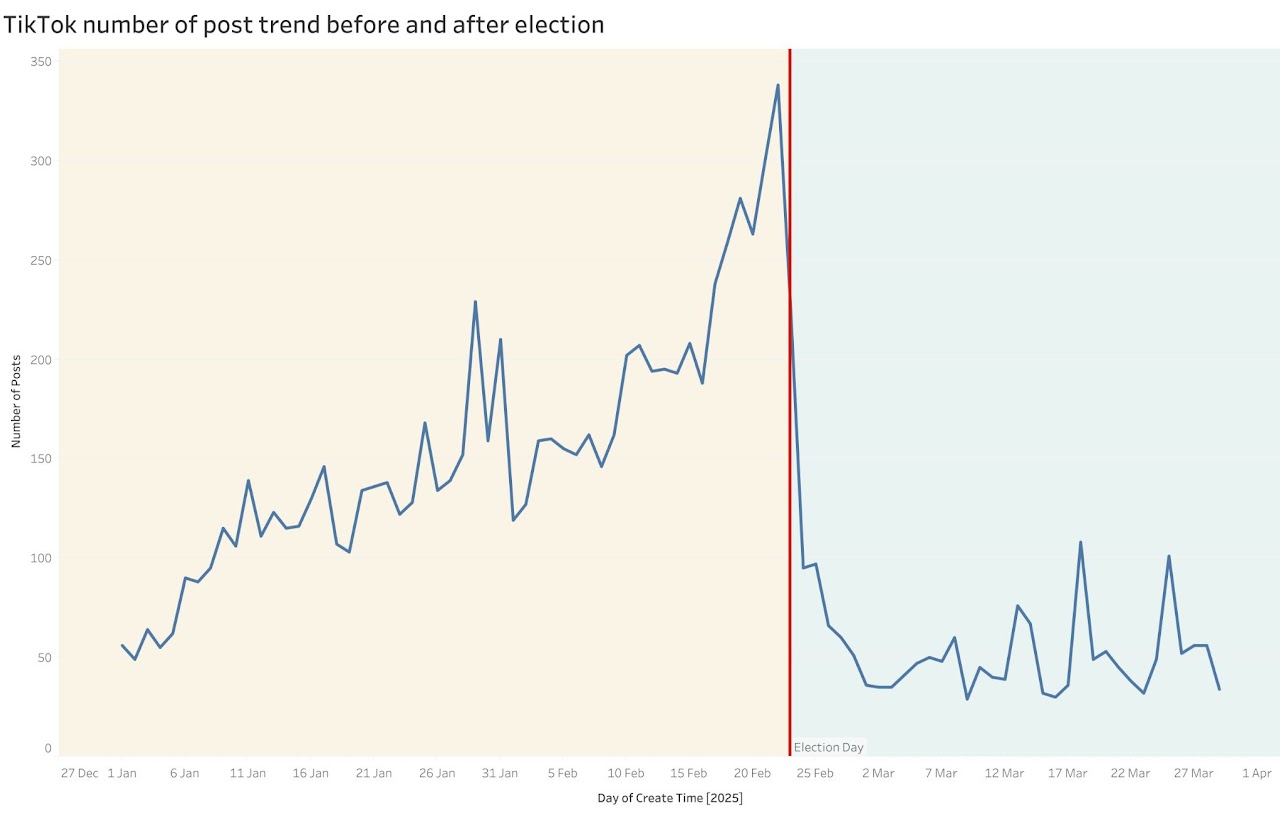
Observatory of Online Politics analyses the role of TikTok in the 2025 federal election
The Observatory of Online Politics, an interdisciplinary project of the I2SC (Interdisciplinary Institute for Societal Computing) led by Dr Rosa Navarrete, is dedicated to observing the evolving role of digital platforms in shaping political discourse and social outcomes. In a blog post, the Observatory analyses the influence of TikTok on the 2025 federal election:
While TikTok is becoming increasingly relevant among social media users, its role in elections remains understudied. The successful social media campaign targeting youth by the party Die Linke has drawn attention to new social media platforms that had previously received little focus, as they have only recently become politically relevant. While researchers in Germany have most commonly addressed the study of platforms such as Facebook and Twitter (now X) and their use in electoral campaigns, we know very little about how German politicians use TikTok, as the platform's success is relatively recent. In this respect, recent data show that the number of Twitter/X users in Germany in 2025 was around 21.63 million (DataReportal 2025).

Talk: „Dilemmas of EU criticism“
The Cluster for European Studies at Saarland University (CEUS) cordially invites you to a guest lecture by Prof Dr Timm Beichelt (European University Viadrina, Frankfurt/Oder):
Prof Dr Timm Beichelt: “Dilemmata der EU-Kritik”
26 June 2025, 18:00-20:00, Campus B3 2, Lecture Hall 0.03
The electoral and discourse successes of European right-wing populism have also given a boost to political Euroscepticism. In many national arenas, but also in Brussels itself, the debate with EU-sceptical parties and actors represents an important part of the debate landscape. In this context, academic criticism of the EU takes on a new dimension, as it not only intervenes in competing conceptions of the world, but also potentially supports right-wing extremist and/or anti-democratic actors with arguments. The lecture and subsequent discussion will be dedicated to the emerging dilemmas of EU criticism.
The event is part of the CEUS lecture series "5th Europe Discourse(s). International European research as a guest at the UdS". The talk is given in German.

Talk by Prof. Dr. Florence Metz: „Navigating the Climate Policy Paradox: Institutional Complexity and the Challenge of Policy Coherence in the EU“
The European Union has made climate action a central policy priority, committing 30% of its 2021–2027 budget—€557 billion—to climate-related spending (European Commission, 2022) and requiring all policy sectors to integrate climate objectives. Yet projections from the Climate Action Tracker (2022) indicate that the EU is unlikely to reach its 2050 net-zero emissions target.
This talk explores the paradox between political ambition and policy effectiveness. I argue that a key explanation lies in a flawed assumption: that as climate policies accumulate, their coherence remains stable. In practice, policies often contradict each other, while their interdependencies are poorly understood.
Building on the Theory of Institutional Complexity Traps, this research shows how expanding policy portfolios can become fragmented and counterproductive when not properly coordinated. Methodologically, I apply network analysis to identify and map the interactions among policy instruments and goals, highlighting areas of synergy and contradiction.
This systems-based approach provides new insights into the structural limits of climate policy integration and suggests why institutional complexity may be a hidden barrier to achieving climate goals. The research is part of the ERC Starting Grant project Climplexity: CLIMate Policy Integration—a ComPLEXITY Trap?

Recording: "Triggers of political engagement"
Dr Alex Hartland gave a presentation at the ActEU Mid-Term Conference entitled “Triggers of political engagement”, in which he described when and how individuals in civil society become politically engaged. The Mid-Term Conference of the Horizon Europe project ActEU took place in Brussels in December 2024. This scientific conference entitled "Strengthening democracy: Building trust and tackling polarisation in Europe" brought together researchers and policy makers to assess the main challenges and achievements of the project. The recording of the presentation is now available online:
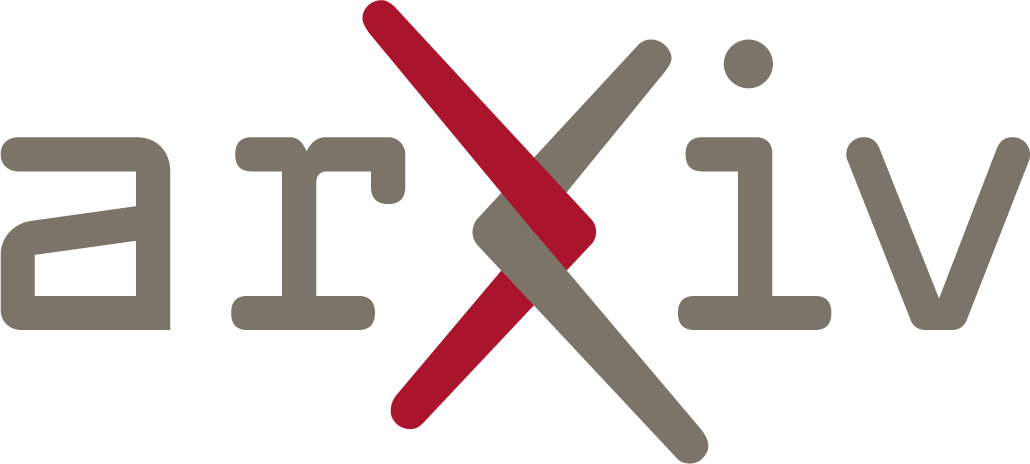
New publication: "Learn, Explore and Reflect by Chatting: Understanding the Value of an LLM-Based Voting Advice Application Chatbot"
by Jianlong Zhu, Manon Kempermann, Vikram Kamath Cannanure, Alexander Hartland, Rosa M. Navarrete, Giuseppe Carteny, Daniela Braun & Ingmar Weber
Abstract: Voting advice applications (VAAs), which have become increasingly prominent in European elections, are seen as a successful tool for boosting electorates' political knowledge and engagement. However, VAAs' complex language and rigid presentation constrain their utility to less-sophisticated voters. While previous work enhanced VAAs' click-based interaction with scripted explanations, a conversational chatbot's potential for tailored discussion and deliberate political decision-making remains untapped. Our exploratory mixed-method study investigates how LLM-based chatbots can support voting preparation. We deployed a VAA chatbot to 331 users before Germany's 2024 European Parliament election, gathering insights from surveys, conversation logs, and 10 follow-up interviews. Participants found the VAA chatbot intuitive and informative, citing its simple language and flexible interaction. We further uncovered VAA chatbots' role as a catalyst for reflection and rationalization. Expanding on participants' desire for transparency, we provide design recommendations for building interactive and trustworthy VAA chatbots.

"Fact or Fake?" simulation game - students take a playful look at how the European Parliament works
How does the European Parliament work? What are the challenges of working in the Parliament? What significance does democracy have in the decision-making process? On 2 June 2025, students of Prof Dr Daniela Braun'sEuropean Integration and Political Instruments course were able to experience this in practice as part of a 4-hour panel game. During this event, organised in cooperation with Europe Direct Saarbrücken, the students had the opportunity to slip into the roles of politicians in the European Parliament and simulate everyday parliamentary life. Their task: to negotiate a new EU regulation on the regulation of disinformation and hate speech in social networks. The students were assigned fixed roles with political positions on the basis of which they were to work out a compromise that was acceptable to all sides. The result: despite long and tough negotiations, the students were unable to agree on a joint draft regulation. What does that mean? It certainly didn't mean that the simulation game was unsuccessful: the students reported that they found it very exciting, interesting and thrilling to put themselves in the shoes of different political positions and try to unite widely divergent positions in a compromise.
The simulation game is an integral part of the European Integration lecture in the Bachelor's degree programme in European Studiesand is met with great enthusiasm by the students. The department is looking forward to organising another simulation game with Europe Direct Saarbrücken next year.
Co-Creation Workshop: “How Should Democratic Parties Address the Issue of Gender Equality in the Future?”
On May 27, 2025, a two-hour gender co-creation workshop was held from 6:00 to 8:00 PM at the FrauenGenderBibliothek Saar, with a total of 13 participants from various age groups and social backgrounds. The aim of the workshop was to develop political recommendations that could serve as guidance for democratic parties in dealing with the issue of gender equality.
Following a brief introduction to the project and the workshop’s objectives, three small groups worked on key thematic areas such as sexualized violence, gender-sensitive language, and care work. Through brainstorming, personal stories, and moderated group phases, major challenges were identified and discussed.
A key takeaway was the respectful and inspiring exchange between participants. Many found the workshop enriching as it opened up new perspectives beyond their previous experiences. In all groups, the topic of sexualized violence was discussed particularly intensively — a clear indication of its societal relevance. The workshop concluded with the development of political recommendations at both the local and national levels.
The results will directly inform the specification of the corresponding work package. A transcription of the group discussions is planned for June 2025.

Youth Democracy Lab
On 24 May, it was time again for the Open Campus Day at Saarland University. In addition to many lectures and participation in two information stands, Professor Braun's department also organised a Youth Democracy Lab as part of the Horizon-funded EU project ActEU under the title “Is trust in European politics at risk?”. Participants were able to get involved, address problems or suggest solutions.
The ActEU project aims to find answers to the following questions: How can we conceptualise and empirically measure political trust and legitimacy beyond the usual survey question ‘How much trust do you have in the Parliament?’? Does the multi-level nature of European representative democracies require an identical level of support from citizens at regional, national and EU level? To what extent does social polarisation on key political issues of our time - immigration, climate change and gender inequality - challenge political trust in democratic political systems and their legitimacy? And what can political decision-makers and civil society do to overcome these challenges?
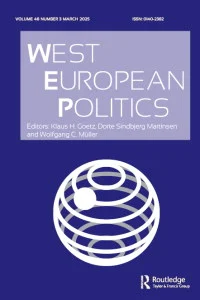
New publication: "The role of key European issues in the 2024 election campaign"
by Alex Hartland, Daniela Braun, Giuseppe Carteny, Rosa M. Navarrete & Ann-Kathrin Reinl
Abstract: International crises and Euroscepticism have made European issues prominent in citizens’ lives. This article studies the role of three key European issues – migration, the environment, and EU integration – for political parties and citizens. The analysis centres on nine EU member states, combining party manifestos from the 2024 European Parliament elections with survey data. It finds a gap between the concerns of citizens and the political parties, an important consideration for election campaigns in general. Moreover, the analysis suggests that the salience in party manifestos has a modest direct influence and a stronger indirect impact on their appeal to citizens in most countries studied. Specifically, citizens concerned with migration and the environment evaluate parties based on the prominence they give to these issues during the campaign. The findings offer important avenues for further research on party issue emphasis and the measurement of issue salience via large language models (LLMs).

Invitation to the event "Democracy in digital times: Ideas that shape our future"
The TEDx Saarbrigge event aims to promote a vibrant democracy in digital times. All interested citizens are invited to the CoHub at Saarbrücker Neumarkt on Saturday, 14 June, from 1 pm to 6 pm to participate. TEDx Saarbrigge aims to bring voices from civil society, science and activism to the stage, which is why numerous international experts will also be guests.
The organisers are Prof Dr Ingmar Weber from the Interdisciplinary Institute for Societal Computing at Saarland University together with Dr Kevin Baum from the German Research Center for Artificial Intelligence (DFKI) and other partners. Prof Dr Daniela Braun will take part as a speaker.

Lecture on the New Climate Divide
Date: 22.05.2025
Time: 16:30-18:00
Place: Bld. C1 7, room 0.08
Endre Borbáth is a junior professor for Empirical-Analytical Participation Research at the Institute for Political Science at Heidelberg University and a visiting researcher at the Centre for Civil Society Research at the Social Science Research Center Berlin (WZB). In his lecture as part of the lecture series Politics in Europe, he will talk about the New Climate Divide - the emerging conflict over climate policy in Europe - and reflect on the process of securing an Emmy Noether fellowship.
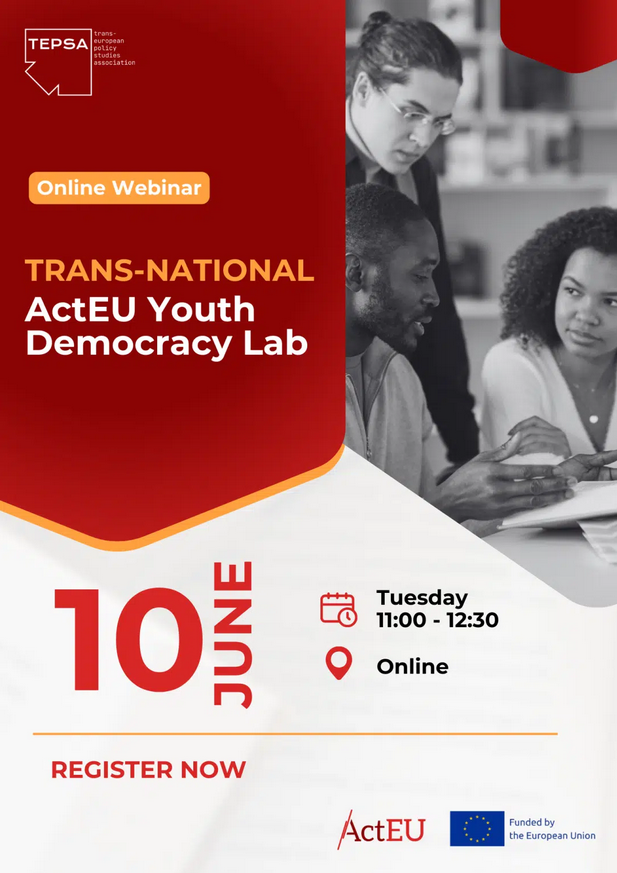
Call for Applications: ActEU Trans-National Youth Democracy Lab
Europe’s democracies are being tested. Trust is eroding. Facts are under fire. Institutions feel distant. And yet, young people across the continent still believe in building a better and more sustainable future.
The Trans-National Youth Democracy Lab, within the framework of the Horizon Europe “Activating European Citizens’ Trust in Times of Crises and Polarization (ActEU)” project, is a space for young people from across Europe to come together and take these issues seriously. Not through lectures. Not through panels. But through small-group conversations that aim to generate honest insights and practical, actionable recommendations. Your deliberations will inform a final recommendations paper which will be shared with a broad network of experts and policy-makers.
The event will take place online on 10 June, 11:00-12:30 CEST. Application Deadline: 27 May.
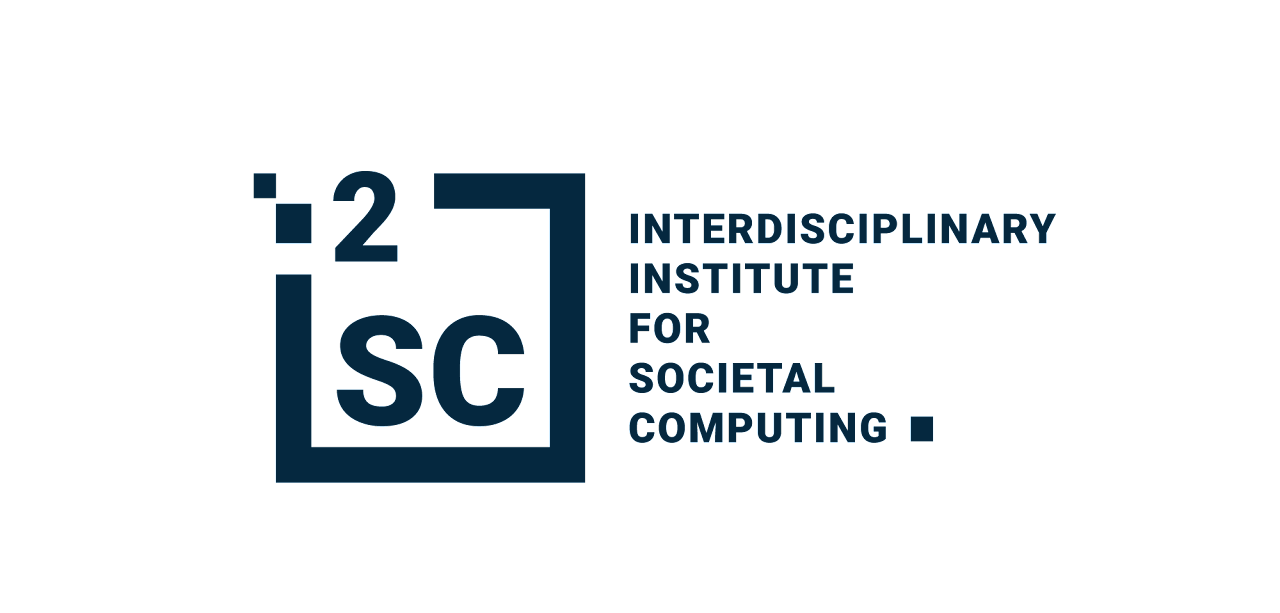
Summer Institute in Computational Social Science
From September 8 to September 19, 2025, the Interdisciplinary Institute for Societal Computing (I2SC) will host the Summer Institute in Computational Social Science, to be held in Saarbrücken, Germany. The purpose of the Summer Institute is to bring together graduate students, postdoctoral researchers, and junior faculty interested in computational social science. The Summer Institute is mainly focussed towards Computer Science students interested in interdisciplinary approaches to social sciences, focusing more on providing computer scientists with experience in social sciences rather than equipping social scientists with computational methods. Graduate social science students with basic knowledge of computer science approaches are also encouraged to join.
Participation is restricted to advanced Ph.D. students, postdoctoral researchers, and junior faculty (within 7 years of their Ph.D). We welcome applicants from all backgrounds, especially from neighboring institutions near Saarbrücken, Germany. About 20-25 participants will be invited. Participants are expected to fully attend and participate in the entire 10-day program. Application materials are due on April 25, 2025.

New publication: Fading EUphoria: party system polarisation and EU attitudes in Greece, Portugal and Spain
Lea Heyne, Rosa Navarrete and Alexia Katsanidou published a new paper in the journal South European Society and Politics:
Greece, Portugal, and Spain transitioned to democracy in the 1970s and joined the EEC in the 1980s, fostering positive EU attitudes through economic growth. However, the Southern European financial crisis and subsequent austerity measures deeply strained EU support, especially in Greece. This study examines how party conflict and EU politicisation influence public attitudes, finding a negative link between EU polarisation and membership support. In Portugal and Greece, polarisation impacts opinions most when EU issues are salient. The study highlights country-specific patterns and the interplay of crises, political strategies, and public opinion on the EU in the Southern European third-wave democracies.
Citizens' opinions sought: How can gender equality be anchored in politics?
What do voters expect from political parties in terms of gender equality? This question will be the focus of a workshop on 27 May from 6 to 8 pm at the FrauenGenderBibliothek Saar, to which all interested citizens are invited. The aim is to jointly develop recommendations for politicians - taking into account as many different opinions as possible. The results will feed into an EU-funded political science research project at Saarland University. Registration is required by 4 May to projekt-untwist(at)uni-saarland.de.
Interested citizens are cordially invited to actively participate in the co-creation workshop and contribute their perspective. As a thank you for taking part, all participants will receive a voucher that can be redeemed in Saarbrücken. As the event will be recorded (audio) for research purposes, all participants will receive further information on data usage in advance.
More about the UNTWIST project
Press release about the workshop
Saarbrücker Zeitung article about the workshop

Ulrich Commerçon, Member of the State Parliament, visits the Observatory of Online Politics
The Observatory of Online Politics, an interdisciplinary project of the I2SC (Interdisciplinary Institute for Societal Computing) led by Dr Rosa Navarrete, is dedicated to observing the evolving role of digital platforms in shaping political discourse and social outcomes. The sobering realisation: lying pays off for politicians. Dr Rosa Navarrete has now discussed this and the Observatory's work with Ulrich Commerçon, who is currently the leader of the SPD faction in the Saarland state parliament. "The work of the Observatory of Online Politics is so important because it looks closely at where boundaries are shifting, where quiet habituation becomes dangerous normality. And because it shows what we can do to counter these developments politically and socially," writes the former education minister on social media. Dr Rosa Navarrete was also pleased about the exchange: "It is important that we share the results of our work at the Observatory with the outside world and in politics in order to strengthen our democracy with facts and data."
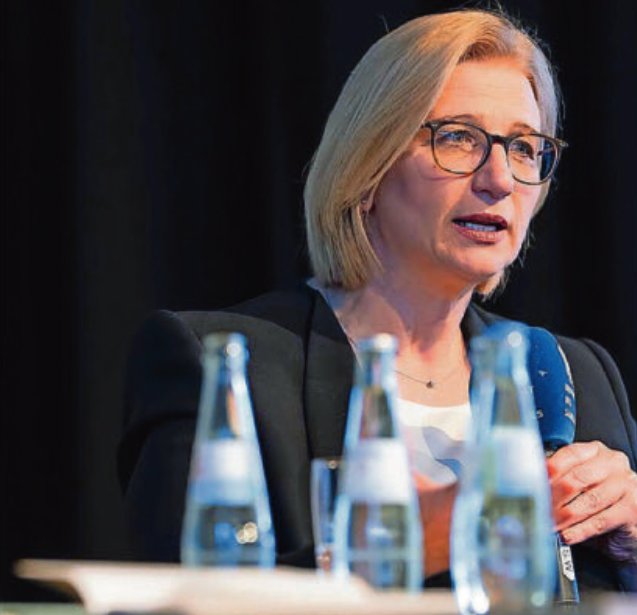
Looking back at the DVPW conference
The annual conference of the German Political Science Association (DVPW) has found a more than exciting venue this year in Saarland University: Political science was only recently revitalised here in the form of two chairs as part of the also very young faculty of European social science research. We were therefore all the more delighted to welcome political scientists from Germany and all over the world. The conference panels and the keynote speech with Bundesrat President Anke Rehlinger led to an exciting exchange on political trust in today's world, and the conference showed that the Saarland University is developing into a centre for political science: Saarland University is developing into an important part of the political science landscape in Germany that you better keep on your radar!
We would like to thank all participants for their active participation, Anke Rehlinger for taking the time for our keynote despite the ongoing coalition negotiations, and the Saarbrücker Zeitung for the two articles published as part of the conference:
“Heimspiel für Anke Rehlinger”
Interview with Prof Dr Daniela Braun and Prof Dr Georg Wenzelburger
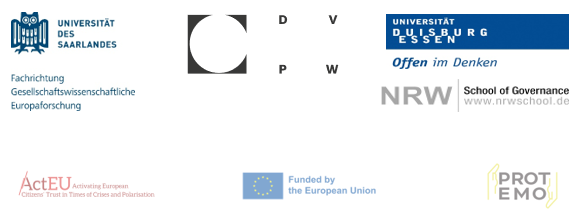
“Citizen’s trust and societal polarization in times of transformation. Comparative Perspectives from different world regions”
The annual conference of the German Political Science Association (DVPW) has taken place at Saarland University on 27 and 28 March 2025. The main aim of this conference was to analyse one of the most pressing problems of representative democracies from different perspectives: Citizens' trust or mistrust in “their” political system, institutions and politicians. In order to place the study of trust and mistrust in a broader context, contributions are also welcome that deal with the connection between citizens and the state in general - a connection that can be expressed in different ways (e.g. public opinion/attitudes of citizens, political behaviour such as political participation, civic engagement, protest behaviour, but also feelings or emotions).

Job advertisement: Research assistant (m/f/d)
Saarland University has a distinctive European profile and a strong European focus in research and teaching with high development potential due to its unique Franco-German founding history and its special geographical location in the border region with France, Luxembourg and Belgium. Cross-faculty and interdisciplinary European research has found a platform in the Cluster for European Studies (CEUS).
The Cluster for European Studies is a central academic institution of the University. As a platform and competence centre, it brings together initiatives and projects of interdisciplinary European research in the humanities, law and social sciences and other activities in the university's historically grown European focus. The Cluster for European Research supports doctoral students and postdocs with Europe-related dissertation and postdoctoral projects in an international working environment through the Junior Research Centre Europe.
View the full job advertisement
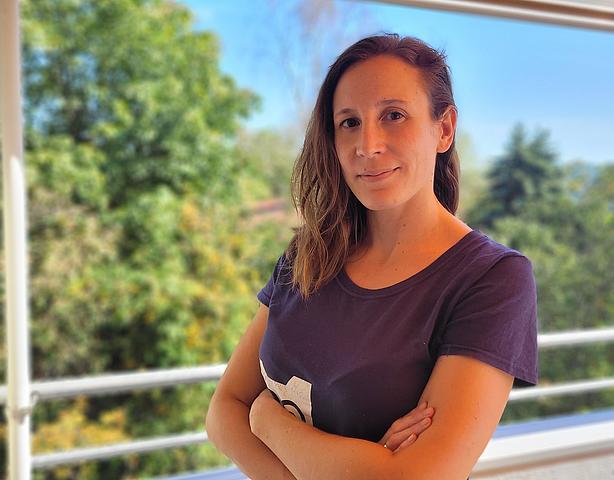
Pressemitteilung: Truth or Lie? Observatory analyses political action on the internet
It pays to lie: those who tell untruths on the internet are now often very successful in politics. Observers usually only look at the short-term consequences of political campaigns on the internet. The consequences of lies and false statements by politicians on the internet have not yet been scientifically observed over longer periods of time. A recently established "Observatory for Online Politics" at Saarland University now wants to change this.
To the full press release
To the website of the Observatory
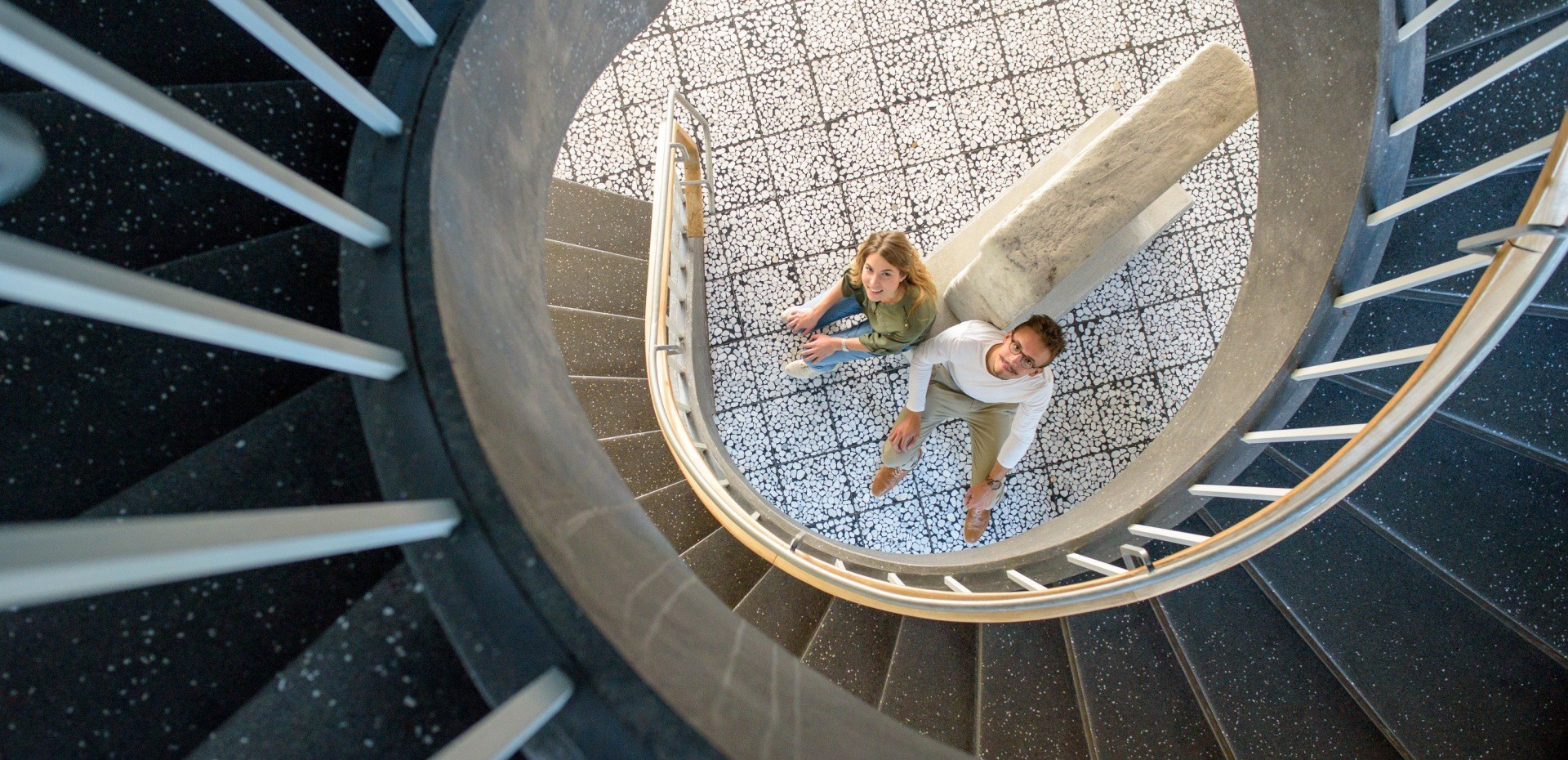
Press release about the DVPW conference
Topics such as trust and distrust in politics as well as social polarisation are the focus of a political science conference on 27 and 28 March, which will bring together experts from Germany and abroad at Saarland University.
They will discuss their current research on one of the most pressing problems of representative democracy: the dwindling trust of citizens in “their” political system and institutions. The symposium of the “Comparative Politics” section of the German Political Science Association (DVPW) is being organised by Professor Daniela Braun and Professor Georg Wenzelburger in cooperation with the University of Duisburg-Essen.

Video: „Untwisting Gender Representation: Evidence-Based Insights for Democratic Renewal“
On 13 February, the Horizon-funded EU project UNTWIST hosted an online event entitled ‘Untwisting Gender Representation: Evidence-Based Insights for Democratic Renewal’. The aim of the event was to analyse the link between the electoral performance of right-wing populist parties and their anti-gender positions. The video will provide you with the following event content:
- A brief overview of the key findings from the UNTWIST project.
- Reflections on the general policy implications arising from the research findings, including country-specific discussions.
- An interactive discussion with participants.

New publication: Is there anything Left?: A Global Analysis on Changes in Engagement with Political Content on Twitter in the Musk Era
Over the past few years, Twitter (now X) has become an influential platform for political discourse. However, prior research suggests that Twitter may be biased towards right-wing content. Following the change in ownership in October 2022, there have been several changes to Twitter’s policies, particularly in content flagging and Twitter Blue Verification. Understanding how any shifts in outcomes vary across different political ideologies is important for comprehending the evolving political discourse, especially given recent developments. To explore this issue, we examine shifts in engagement (characterized by likes and retweets) for political figures before and after November 2022, focusing on describing how engagement has changed over time. We perform a global analysis by collecting tweets from 6550 accounts belonging to political leaders and parties from twelve countries among the ones with the highest user activity on the platform, namely, Argentina, Brazil, Canada, Colombia, France, Germany, India, Japan, Mexico, Spain, the United Kingdom, and the United States, between June 2021 and June 2023. Our findings indicate that the number of likes on political tweets increased after November 2022. However, we observe that the number of retweets decreased significantly, along with a marginal decrease in the likes-to-retweet ratio, with no statistically significant difference between the Left and the Right. Our study is the first to offer a global perspective by examining how platform engagement has shifted during the Musk Era. To support further research, we release the data on politicians and parties used in this study, with their Twitter data available upon request.
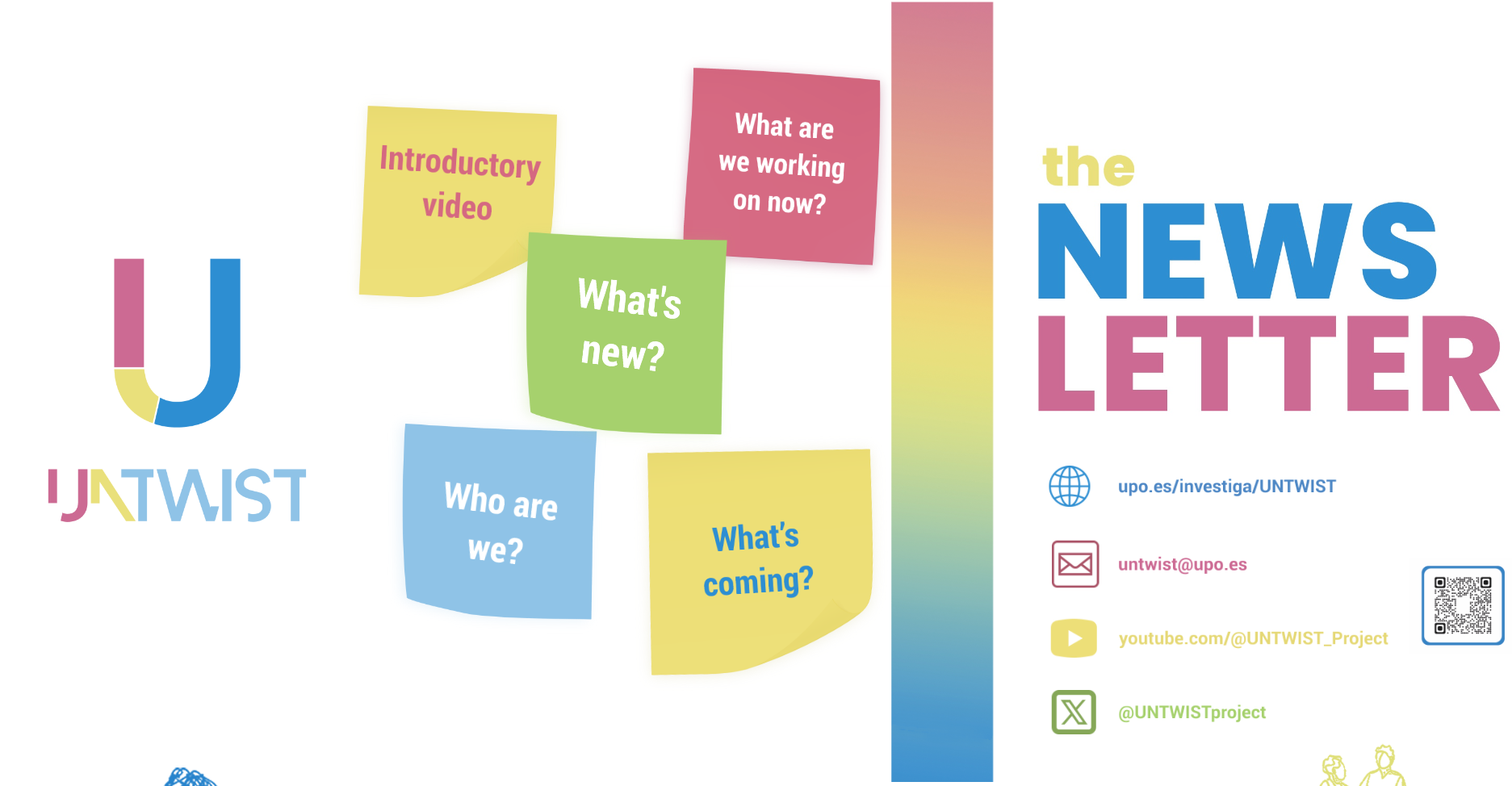
Second UNTWIST newsletter published
The UNTWIST project has published its second newsletter. The topics:
- Work Package 1: We have developed a grid concept that helps us to categorise and evaluate policy decisions.
- Outlook: What will the next Work Packages be about?
- Meet the team: The researchers from the Universidad Pablo de Olavide (UPO) introduce themselves.

What is ActEU?
The Trans European Policy Studies Association (TEPSA) has published a video as part of the ActEU kick-off conference in which Prof Dr Daniela Braun and Prof Dr Michael Kaeding present the Horizon-funded EU project ActEU.
The ActEU project aims to find answers to the following questions: How can we conceptualise and empirically measure political trust and legitimacy beyond the usual survey question ‘How much trust do you have in the Parliament?’? Does the multi-level nature of European representative democracies require an identical level of support from citizens at regional, national and EU level? To what extent does social polarisation on key political issues of our time - immigration, climate change and gender inequality - challenge political trust in democratic political systems and their legitimacy? And what can political decision-makers and civil society do to overcome these challenges?

New publication: Another sleeping giant? Environmental issue preferences in the 2019 European Parliament elections
Prof. Dr. Daniela Braun, together with Dr. Leonardo Puleo, Prof. Dr. Eftichia Teperoglou and Dr. Ann-Kathrin Reinl, has published a new article: Seminal works have highlighted a growing polarisation regarding the environment, with supporters advocating for immediate emissions reduction and others downplaying or even denying human-caused climate change. Despite this debate, little attention has been focused on how voters’ environmental preferences influence their electoral behaviour. Using the metaphor of the ‘sleeping giant’ from European Union politics literature, the article empirically explores how environmental issue preferences impact voting choices. Analysing stacked data from the 2019 European Election Study, the article examines the phenomenon of environmental issue voting by shifting the unit of analysis from individuals to party-voter dyads. Results reveal that environmental preferences moderately, yet significantly, affect vote choice. This effect is more pronounced among left-leaning voters and in countries where the environmental issue is more salient among the public. Our findings shed light on patterns of environmental preference and their role in European electoral competition.

Contribution to the WDR 5 podcast „Wissenschaft und mehr“ (Science and more)
On 7 November 2024 Prof Dr Daniela Braun took part in the episode „Wiener Narrenturm und Psychiatrie – 1,5-Grad-Schwelle – Glaube“ of the WDR 5 podcast „Wissenschaft und mehr“. Among other issues the episode was related to the matter of trust in political institutions and the political system.

Review of the 4th Europe Conference Saarbrücken
The European Union was once imagined as a dream: as a peace project in which European societies live together in unity and borders are dismantled, as a dream of unity in diversity. At present, pressing pan-European and globally relevant issues are presenting Europe and European politics with major challenges and are increasingly demanding decisions and solutions at a European level. However, high political ambitions often fail to be realised. Tensions between political aspirations and social reality are increasingly noticeable and provide a breeding ground for populist and Eurosceptic movements. The 4th Europe Conference Saarbrücken focussed on these tensions and looked at the resulting conflicts and consequences. Prof Dr Braun gave a talk on the effects of consolidated Euroscepticism on European politics.
Full review with photo gallery

Prof Dr Armin Schäfer: "Schlechte Verlierer:innen? Populismus und die Akzeptanz von Wahlergebnissen in Europa"
Date: 21.11.2024
Time: 16:30-18:00
Place: Building C1 7, room 0.08
As part of the political science lecture series Politics in Europe with an interdisciplinary focus, Prof Dr Armin Schäfer, Professor of Comparative Politics at Johannes Gutenberg University in Mainz, will give a lecture entitled “Bad losers? Populism and the acceptance of election results in Europe”. In it, he will analyse the influence that election results can have on political trust in democracy. The election results should not affect the fundamental evaluation of democracy. However, research on “losers’ consent” has shown that the winners rate democracy more favourably than the losers.
Interested parties are cordially invited to attend. Pre-registration is requested at vinciane.pilz(at)uni-saarland.de.

Conclusion on the ActEU Mid-Term Conference
On 12 December, the ActEU Mid-Term Conference took place in Brussels to present the first results of the project and promote collaboration between researchers and various stakeholders. Dr Alex Hartland presented his and Prof Dr Daniela Braun's work in two presentations: “Engagement triggers in response to controversial policies” and “Polarisation among EU political parties”. After the conference, participants had the opportunity to socialise over dinner in a more informal setting.

New publication by Dr Rosa Navarrete: "Social Media, Misinformation, and Attitudes Towards Democracy in Germany During the Covid-19 Pandemic"
Abstract: Social media platforms are a double-edged sword, serving as sources of both critical information and harmful misinformation. This duality has sparked debates about their potential role in threatening democracy, boosting radical parties, and amplifying authoritarian and populist attitudes. While much research has focused on how misinformation and social media usage can influence voting for radical and populist parties, research on how diffuse and specific support for democracy are affected by the level of misinformation is more scarce. This study examines how satisfaction with democracy, democratic legitimacy, and adherence to liberal democratic principles are shaped by social media usage and citizens’ susceptibility to misinformation. Employing novel data from an online survey conducted in Germany in June 2021, we show that political information sources and misinformation exposure have a greater impact on perceptions of democratic functioning than on support for democracy as a political ideal. Furthermore, for citizens prone to believing misinformation, media consumption habits have no significant impact highlighting a critical blind spot in addressing democracy’s resilience in the digital age.

Student assistants wanted!
The project Political Deception in the Digital Era directed by Dr Rosa Navarrete (Chair of Political Science with focus on European Integration and International Relation and the Interdisciplinary Institute for Societal Computing) and funded by the Saarland University and in the Observatory of Online Politics is looking for two student-assistants (preferably with a BA-degree) interested in and willing to support us in our project.
Are you passionate about online politics and interested in contributing to impactful research? With the German elections approaching in February, we are seeking two proactive and enthusiastic students to join our Observatory of Online Politics. This project will monitor and analyse the online activity of political actors throughout the electoral campaign and its aftermath.
As a student assistant, you will play a critical role in building the infrastructure needed to gather and manage online data from diverse sources, including Bluesky, Telegram, websites, and other relevant platforms. You will collaborate with a dynamic, interdisciplinary team of social scientists and computer scientists to produce research outputs that have real-world societal impact.

Summary of the talk "Gender and violence in focus: Sexualised warfare and women in terrorism"
As part of the event to mark the International Day for the Elimination of Violence against Women (25.11.2024), Djamila Jabra, M.A. gave a lecture at the FrauenGenderBibliothek Saarbrücken on the targeted use of sexualised violence as a weapon and the role of women in terrorist organisations. The lecture explored the question of how security policy issues such as terrorism and conflicts can be viewed from a gender perspective and what new insights can be gained from this.
At the beginning of the lecture, sexualised violence was explained as a targeted military strategy in war situations. This strategy aims to demonstrate power, intimidate and destroy social structures and is historically as old a war strategy as wars themselves. Furthermore, this form of violence is used to control and suppress political opponents and as an act of retaliation against communities. Case studies from countries such as Iran, Sudan and Myanmar illustrate this reality. In the course of the presentation, the far-reaching psychological and social consequences of sexualised violence were also discussed. Those affected suffer from severe trauma, with stigmatisation making reintegration into their community even more difficult. Of particular concern is the frequent lack of judicial action, which largely guarantees impunity for the perpetrators. In 2023, more than 170 armed conflicts were registered worldwide, directly affecting millions of women and girls. Despite international efforts to combat sexualised violence, the implementation of protective measures remains limited. In this regard, it should be noted that less than 26% of peace agreements contain explicit provisions on gender-based violence, although studies show that the participation of women increases the likelihood of sustainable peace processes.
The presentation was followed by a discussion of key challenges. In particular, the lack of accountability, limited resources for survivors and the integration of feminist approaches into security policy measures were addressed. These approaches could help to document sexualised violence and promote peace processes. Furthermore, it is emphasised that gender-based violence should not only be seen as a humanitarian problem, but also as a security policy problem.

ActEU Mid-Term Conference
The political chair at the University of Saarland are pleased to share with you the draft programme for the ActEU Mid-Term Conference, which will take place on Thursday, 12 December 2024 in Brussels. The event will showcase the project’s initial findings and foster collaboration between academics and diverse stakeholders. Following the conference, we will host a dinner to further engage with all participants in a more informal setting. We hope you will be able to join us for this evening gathering, as it would be a great opportunity to continue the conversations and strengthen our collaborative ties.
Additionally, a workshop with an interactive session (the programme will be available in the coming days) with our Civil Society Network will take place the day after, on Friday 13 December 2024 (9:00-13:30) . Please let us know if you are interested in participating, as your insights and expertise would be a valuable addition to the discussions.

New publication: “Quality not quantity: Lobbying institutions and the influence of asylum rights groups.”
Dr Alex Hartland has published an article in the British Journal of Politics and International Relations in which he examines the influence of asylum lobbyists on legislation in Germany and the UK.
With participation in electoral politics limited, asylum seekers rely on lobbying to influence policy, but the factors which facilitate or constrain this process remain unclear. He interviewed asylum rights lobbyists in Germany and the United Kingdom to study the effects of lobbying institutions, using process tracing to identify influence mechanisms. Contrary to previous research, he finds that successful lobbying stems from the quality not the quantity of institutions. He shows how Germany’s corporatist institutions provide stable lobbying structures, building trustful working relationships. This enables collaborative policymaking and increases opportunities for influence. Informal, inconsistent structures in the United Kingdom’s pluralist system impair trust, reducing collaborative policymaking and influence. UK institutions are more policy responsive, however, enabling groups to capitalise on favourable public opinion, whereas the German system remains stable. The results demonstrate the effects of institutional arrangements and identify mechanisms which can improve policy outcomes for asylum seekers and other disadvantaged groups.

“Securing Europe’s Future” Polish Pre-Presidency Conference, Warsaw, 21-22 November 2024
On 1 January 2025, Poland will take over the rotating presidency of the Council of the European Union for the second time. Following a politically charged and controversial Hungarian Presidency, the Polish Presidency will face a number of challenges in the first half of the year. In order to tackle these successfully, a solid basis for decision-making is required. This highlights the importance of bridging the gap between policy makers, academics and citizens in Europe.
The Trans European Policy Studies Association (TEPSA) and the Institute for European Studies at Jagiellonian University have therefore organised the conference “Securing Europe's Future” in Poland. The aim of the conference is to discuss which goals, priorities and policy areas in the EU require the most attention. TEPSA will also make recommendations to the future Council Presidency at the conference, which will serve as preparation for the Polish Council Presidency.
At the conference, Prof Dr Daniela Braun will present the EU-funded Horizon project “Activating Citizens Trust in Times of Crises and Polarisation (ActEU)” on 21 November in the panel “EU Democracy Renewal: Addressing the Pressures on Representative Democracy in Europe”, moderated by Petr Kratochvíl of the Institute of International Relations.
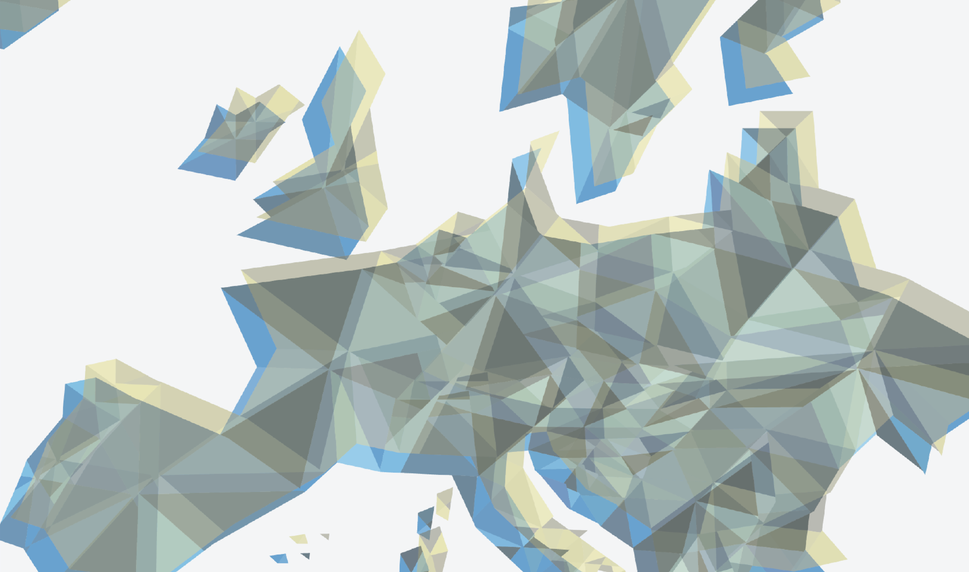
4th Saarbrücken Europe Conference at the UdS
Europe dreams? Between political ambition and social reality
The 4th Saarbrücken Europe Conference will open on 28 November with a panel discussion on the topic of “Visions of Europe. Franco-German perspectives” at Saarbrücken Town Hall. The next day, the programme of events will take place at Saarland University. This primarily includes panels on political and social topics. At 11:45, Prof. Dr Daniela Braun will give a lecture on the effects of consolidated Euroscepticism on European politics.

Talk: "Gender and violence in focus: Sexualised warfare and women in terrorism"
Date: 25.11.2024
Time: 18:00-20:00
Place: FrauenGenderBibliothek Saar
On the International Day for the Elimination of Violence against Women, Djamila Jabra, M.A. will speak about a special form of gender-specific violence: the use of sexualised violence as a weapon in conflicts. What changes when security policy issues such as terrorism, weapons and violent conflicts are viewed from a gender perspective? What is the significance of integrating feminist approaches into security policy and what new insights can be gained from this? The focus is on the role of women in terrorist organisations and the question of how gender-specific violence is used as a strategic instrument of power.

Panel: "Nationalism and Climate Change"
Climate change is an existential threat to mankind. Yet the structuring of politics in a system of sovereign states is a huge obstacle to the collective action on a planetary scale needed to deal with this crisis. This panel explores the ways in which nationalism intersects with efforts to address climate change, both at the level of domestic politics and international relations; and in both negative and positive respects.
Dr Rosa Navarrete took part in a panel moderated by Prof Dr Peter Rutland (Wesleyan University) at the Association for the Study of Nationalities, alongside Prof Dr Daniele Conversi (Universidad del País Vasco) and Prof Dr Marianna Poberezhskaya (Nottingham Trent University).

The chair at the Digital Democracy Workshop in Zürich
As part of the interdisciplinary cooperation I2SC initiated at the UdS by Prof Dr Daniela Braund and Prof Dr Ingmar Weber, research assistants Dr Alex Hartland and Dr Giuseppe Carteny from the Chair of Political Science and Dr Jianlong Zhu from the Chair of Societal Computing have developed a joint research project on the topic of “Chatbots at the Ballot Box: How do AI Chatbots Influence Political Attitudes and Behaviour?”, which Dr Rosa Navarrete presented at the Digital Democracy Workshop in Zurich. The talk focussed on how the rapid development of AI is increasingly influencing online information and people's interactions with it. This technology is also becoming a more important source of information for voters, with potential implications for political attitudes and behaviour. As little research has been conducted into these effects, the study draws on findings from election counselling tools and misinformation research. The results are intended to highlight the opportunities and risks of AI for democratic institutions.
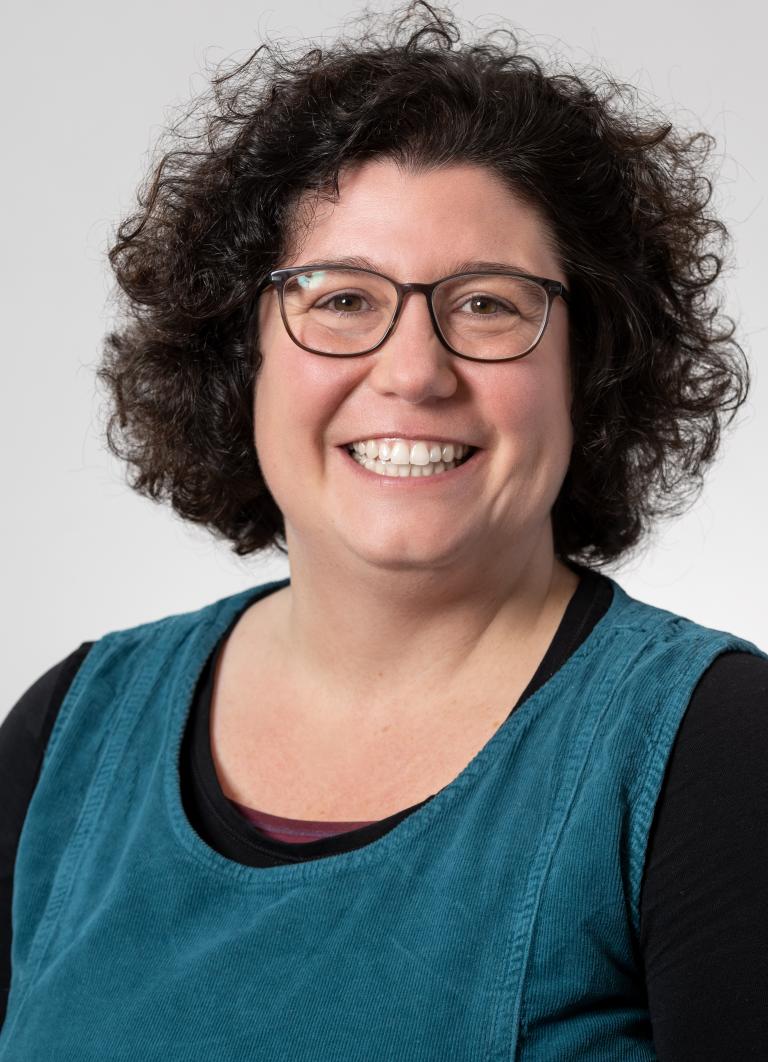
Prof Dr Jale Tosun: "Climate policy portfolios that accelerate emission productions"
Date: 07.11.2024
Time: 16:30-18:00
Place: Bld. B3 1, Lecture hall II
As part of the political science lecture series Politics in Europe with an interdisciplinary focus, Prof Jale Tosun, Professor of Political Science at the Institute of Political Science at Heidelberg University, will give her lecture "Climate policy portfolios that accelerate emission productions". She will address the question of what effect the growing body of national climate policies actually has on climate change. In particular, she will focus on what kind of climate policy portfolios are best suited to accelerate emission reductions in line with the goals of the Paris Agreement. To this end, she will use examples to present the findings and results of her work.
Interested parties are cordially invited to attend. Please register in advance at vinciane.pilz(at)uni-saarland.de.
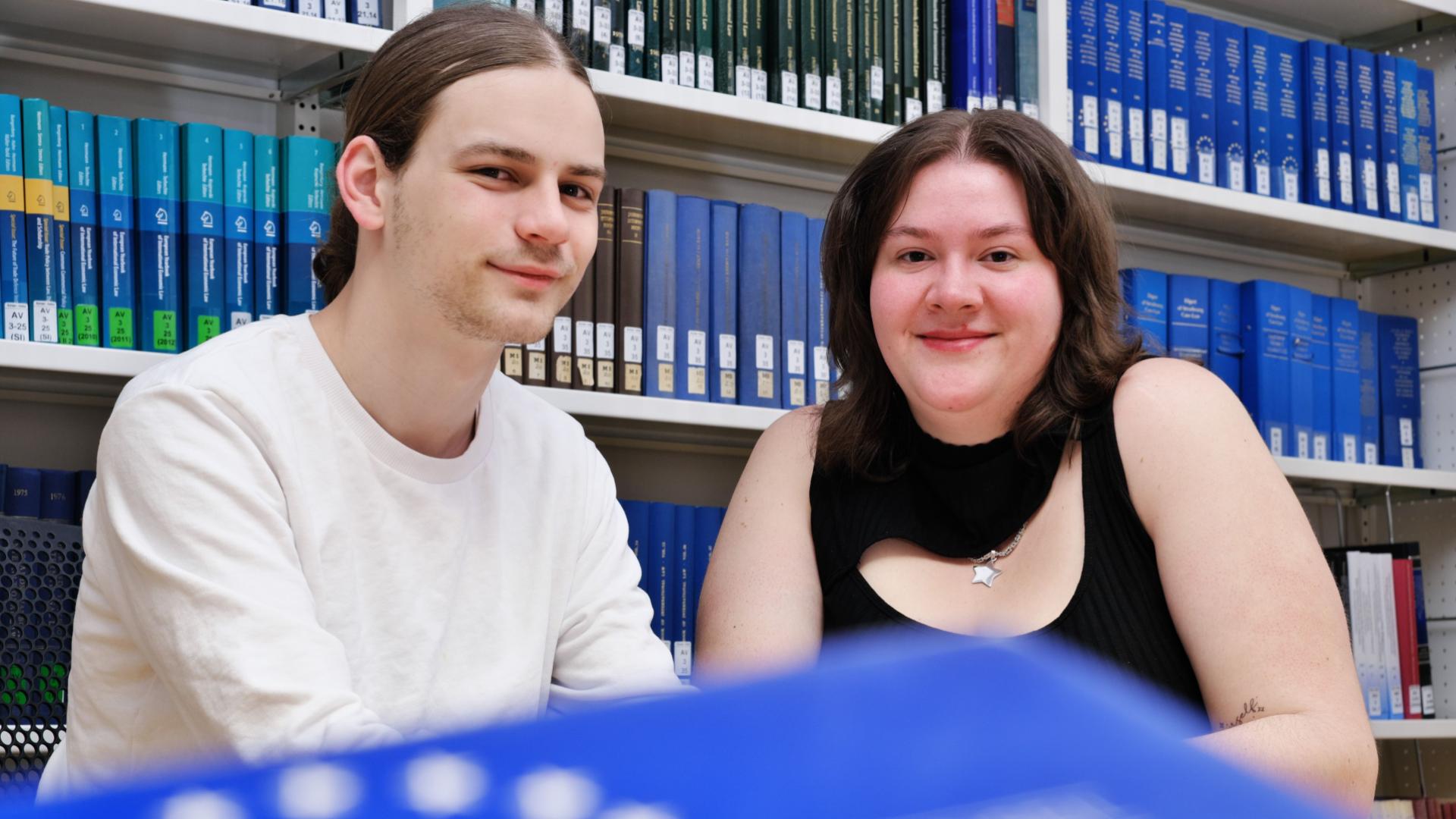
Article about European Studies: Politics - Law - Society in the web magazine Campus
The campus magazine has published an article on the Bachelor's degree programme "European Studies: Politics - Law - Society". Students on the new degree programme and Prof Dr Daniela Braun, who co-initiated the course, were interviewed.

First issue of the UNTWIST newsletter published
The UNTWIST project has published the first issue of its newsletter. The topics of this issue:
- Who are we? We introduce you to our 9 national teams and the 7 institutions involved in an advisory capacity, as well as our objectives related to the UNTWIST project.
- What are we currently working on? We will present the first results and findings on what and how much attention the different gender-specific needs and requirements receive from society, political parties and academia. We also analyse the way in which radical right-wing populist parties address gender-specific issues that may be overlooked by other moderate actors.
- What's new? We will introduce you to our international UNTWIST survey, with which we will conduct innovative measurements of gender-specific needs and demands from an intersectional perspective that simultaneously takes into account the voting behaviour of citizens.
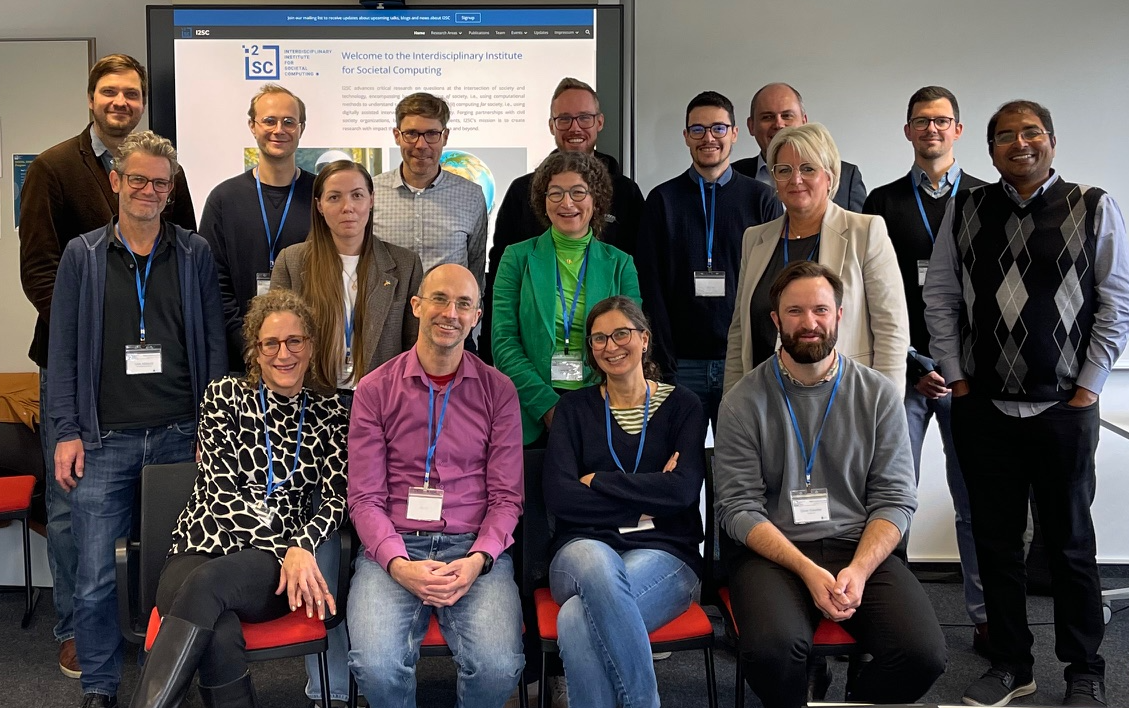
Digital Democracy Days 2024 at Saarland University
Digitalisation is having a profound impact on democracy, both positive and negative. Phenomena such as Donald Trump's election success and social movements show how digital technologies are changing political processes. A key question is which aspects of democracy are affected and how negative effects can be tackled. The I2SC (Interdisciplinary Institute for Societal Computing), a research institute founded by Prof Dr Daniela Braun and Prof Dr Ingmar Weber, therefore organised a two-day conference entitled “Digital Democracy Days”, bringing together 20-30 experts from various disciplines to discuss opportunities and risks. It was emphasised that further research is needed to secure democratic processes in the digital age and that collaboration between different fields is crucial.
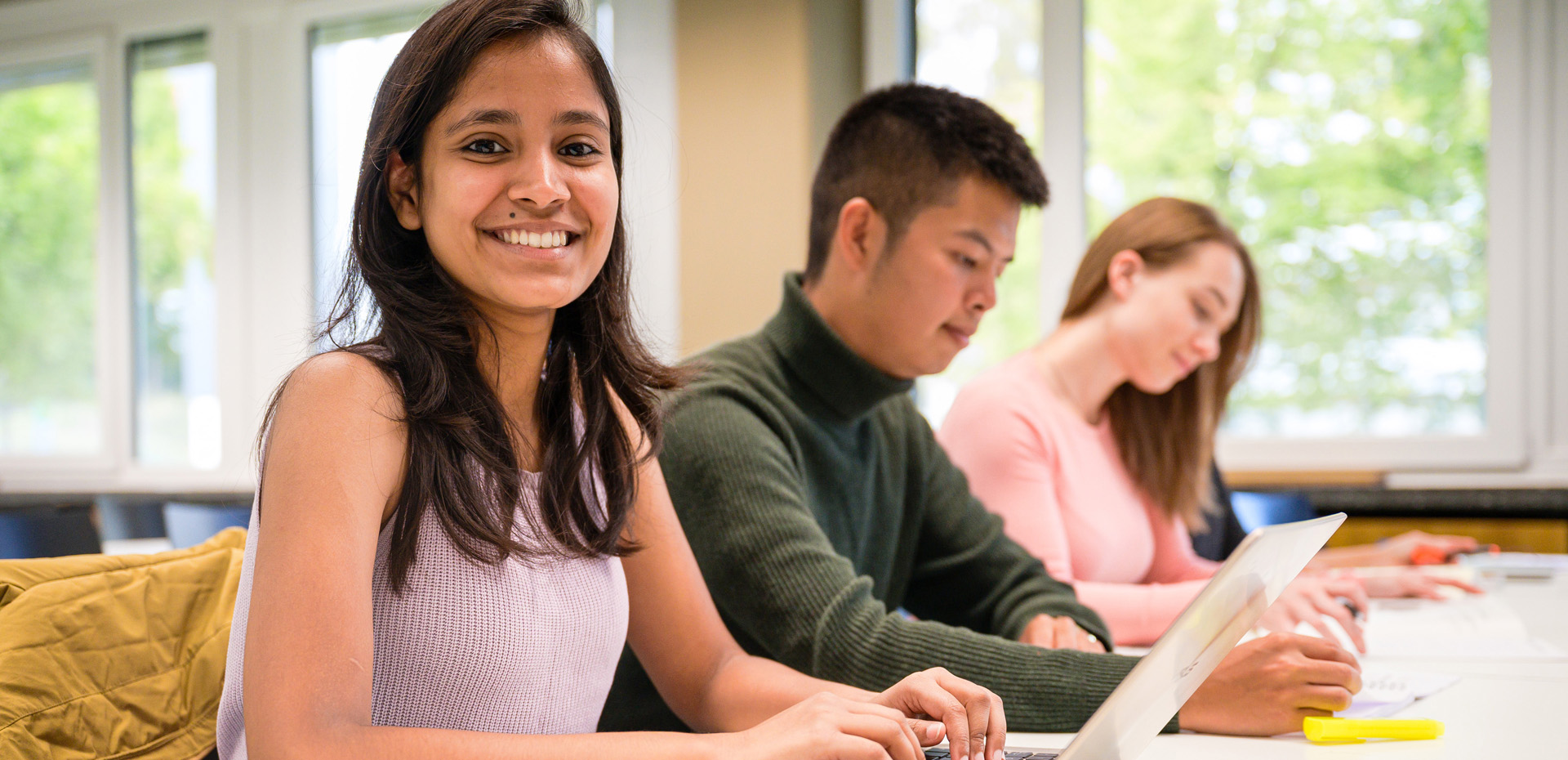
ActEU-Workshop: Aufruf zur Einreichung von Bewerbungen
In February 2025, the ActEU Doctoral School will take place, where participants will spend four days exploring the topics of the ActEU research project, helping to advance our understanding and solutions. The ActEU (Activating European Citizens' Trust in Times of Crises and Polarisation) project, funded under the EU's Horizon Europe programme, aims to conceptualise and empirically measure political trust and legitimacy beyond conventional methods to explore how policy makers and civil society can respond effectively to these challenges to support democratic governance.

Talk at the EISA Pan-European Conference on International Relations (PEC)
The EISA Pan-European Conference on International Relations (PEC) took place in Lille from 27 August to 31 August. Djamila Jabra, M.A. gave a presentation entitled "From Warnings to Wars - A Comprehensive Review of IPCC Reports on Climate and Conflicts". In her presentation, she analysed how the connection between climate change and violent conflicts is presented in the six IPCC reports from 1990 to 2023. Using a qualitative content analysis according to Mayring, she analysed the terms conflict, violence, war, armed, threat and risk in order to identify the visibility of climate-related conflicts. Theoretically, she drew on the expanded security concept of international relations, which goes beyond state approaches to identify potential causes of future conflicts and their prevention.
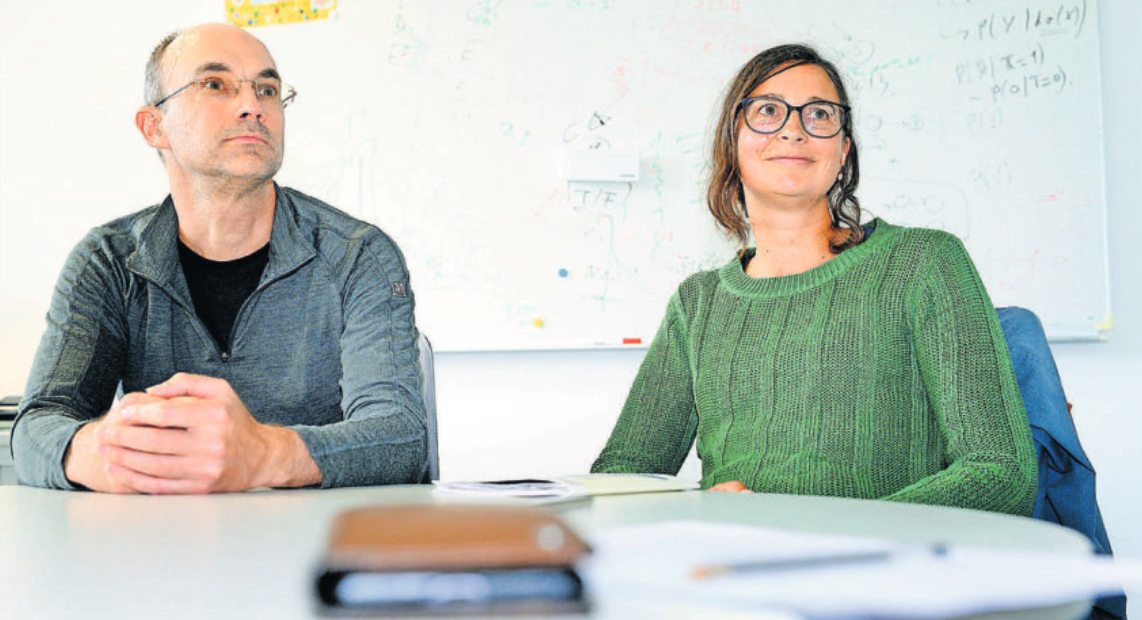
Saarbrücker Zeitung reports on I2SC
A year ago, the "I2SC" - Interdisciplinary Institute for Societal Computing - was founded at Saarland University as a new research institute that brings together computer science and political science. The idea behind it: “The computing of society meets computing for society, so to speak,” says Ingmar Weber, Humboldt Professor of AI, who heads the "I2SC" together with political scientist Prof Dr Daniela Braun at the young department of Societal European Studies. The coupling of computer science and political science is "still relatively new in Germany" (Braun) and harbours challenges. However, despite their different research interests, the synergy effects of their collaboration outweigh the challenges.

Prof Dr Braun at panel discussion on Franco-German relations
Prof Daniela Braun was invited to take part in a panel discussion on the topic of “Franco-German relations in a changing Europe” on Saturday, 28 September. The event, organised as part of the alumni exchange of the members of the alumni Master GPRE e.V., took place from 13:00 to 15:30 in the Villa Europa, Kohleweg 7, 66123 Saarbrücken.
The panel of panellists consisted of:
- Dr Stefan Seidendorf, Deputy Director, Deutsch-Französisches Institut (dfi)
- Dieter Hackmann, Member of the Board for Special Tasks, Association of Franco-German Societies for Europe (VDFG) & Chairman Weimarer Dreieck e.V.
- Prof Daniela Braun, Professor of Political Science specialising in European Integration and International Relations, Saarland University
The discussion was moderated by Jerome Friedrichs and Maya von Thenen and co-organised by Nolwenn Etienne and Tim Georgi.
Here is a brief description of the topic of the discussion: Franco-German relations in a changing Europe
The recent elections to the EU Parliament have confirmed the unstoppable rise of right-wing parties as a pan-European trend on the one hand and triggered a political earthquake in France on the other. 20 years after the ‘eastward enlargement’, the EU is facing a series of new geopolitical questions and challenges, and its future seems more uncertain than ever. Even if Franco-German co-operation is still considered a key driving force in Europe, the EU is driven by a multitude of complex dynamics and the Franco-German friendship no longer seems to be Europe's guarantor. At a time of multiple crises, especially in light of Russia's war of aggression against Ukraine, we are once again reminded that European cohesion and solidarity must be actively practised. Together with experts from institutions and academia, we therefore want to explore the question: Quo vadis Franco-German relations? Quo vadis Europe?
The panel discussion was prepared by a workshop that took place on the same morning. The participants, consisting of around 25 alumni, including three DFH-sponsored degree programmes, were also sent two texts in advance for preparation. Participants were also invited to ask questions at any time.
The debate was very stimulating and there was a lot of positive feedback. It is to be hoped that many of the topics raised and possible solutions will be discussed further in various contexts.
The event concluded with a joint visit by all participants to the Historisches Museum Saar.
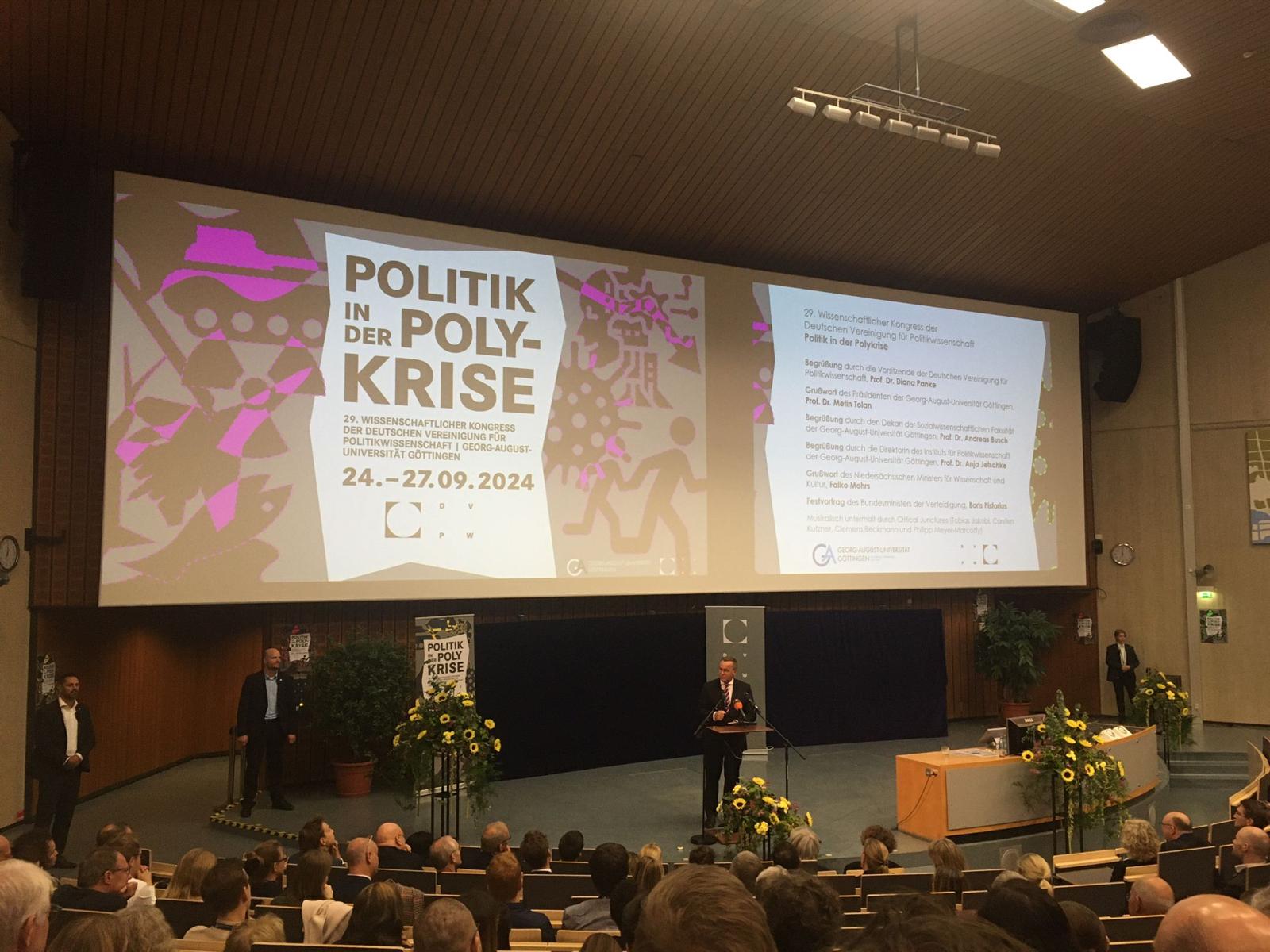
The Chair at the DVPW Congress in Göttingen
From 24 to 27 September, the congress of the German Political Science Association on “Politics in the Polycrisis” took place at the Georg August University in Göttingen. The chair took part in the congress and gave three presentations. Prof Dr Braun also took part in a panel and a podium discussion.
![[Translate to Englisch:] Logo ecpr](/fileadmin/upload/lehrstuhl/braun/Tagungen/ecpr_Logo.png)
UNTWIST at the European Conference on Politics and Gender
In July 2024, the UNTWIST teams participated in the European Conference on Politics and Gender in Cologne and presented a panel with research findings related to a better understanding of gender dynamics in voting for radical right-wing populist parties. Prof Dr Daniela Braun and Dr Giuseppe Carteny presented the following paper:
The salience of gender-related issues in European party manifestos
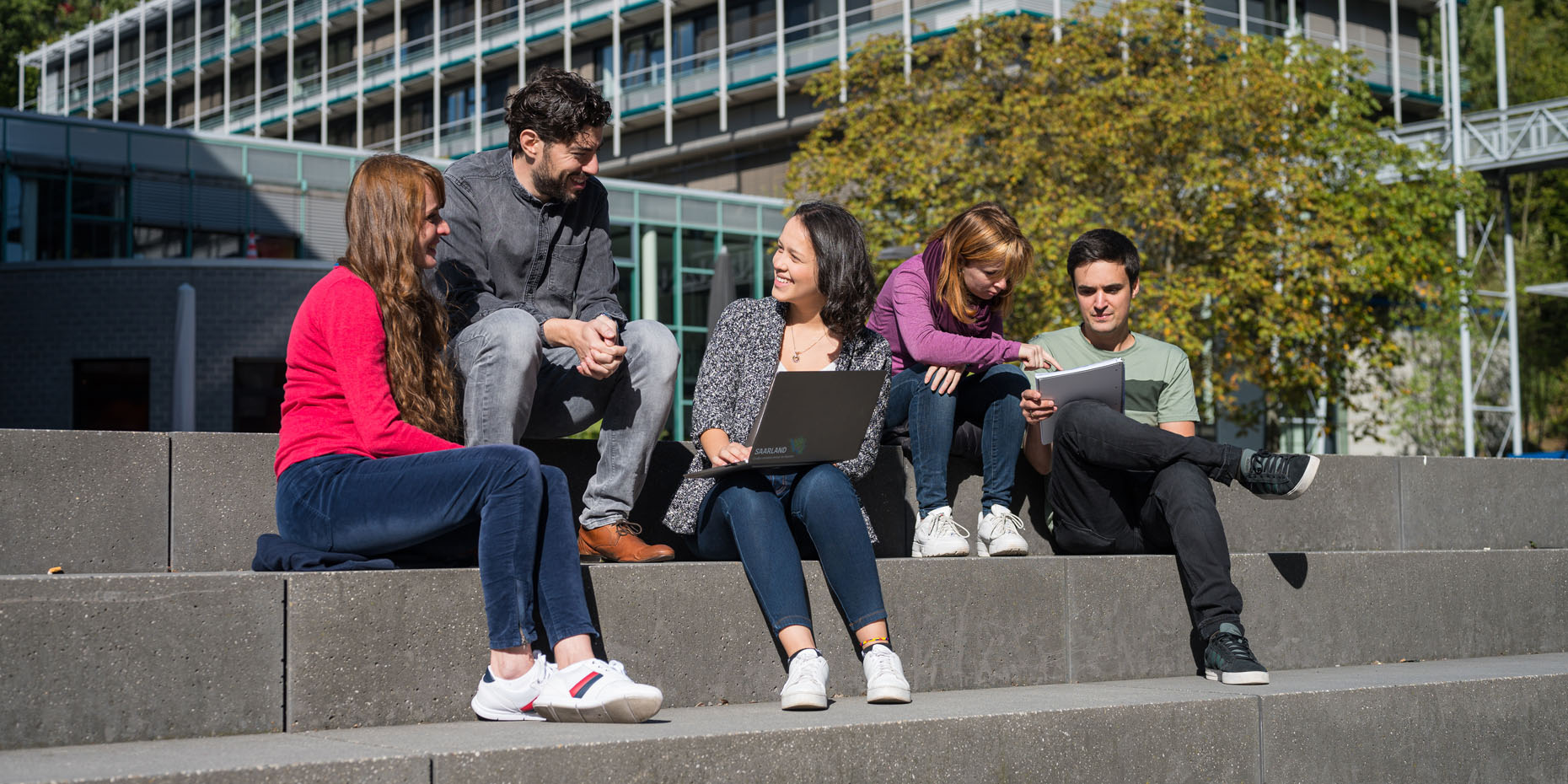
Welcome Day on 10. October
On 10 October, we will be welcoming new European Studies students to Saarland University from 10 a.m. in Building C3 1, Lecture Hall 1. At our Welcome Day, the new students will get to know the campus and the canteen and find out everything they need to know about the degree programme and their respective specialisations.
DVPW-Tagung 27.-28.03.2025: Bewerbungsfrist für BEITRÄGE und CLOSED PANELS bis 30. September 2024
Application procedure
After having received proposals for panels, we now open the second phase of the application procedure with a call for three categories of panels and papers. This application phase will end on September 30, 2024.
Paper submissions directed to one of the open panels (see below): Papers can be submitted to one of the panels proposed for the conference (see the list below). Paper submissions should include a title and an abstract of 250 words. Please send the paper proposals to the conference mail address tagung-dvpw-vergleich-2025(at)uni-saarland.de as well as to the respective panel chairs.
Papers unrelated to one of the panels: Paper proposals can also be directly sent to the conference organization team. We will then create panels that comprise thematically related papers. Please send the paper proposals to the conference mail address tagung-dvpw-vergleich-2025(at)uni-saarland.de.
Closed panel proposals: We also invite closed panel proposals. These should include a panel abstract, panel chairs as well as a maximum of 4 papers related to the scope of the panel with title and abstracts. Please send the panel proposals to the conference mail address tagung-dvpw-vergleich-2025(at)uni-saarland.de.
The team of organizers will inform submitters of papers and closed panels by October 11, 2024.
Please visit also the conference homepage for more information.
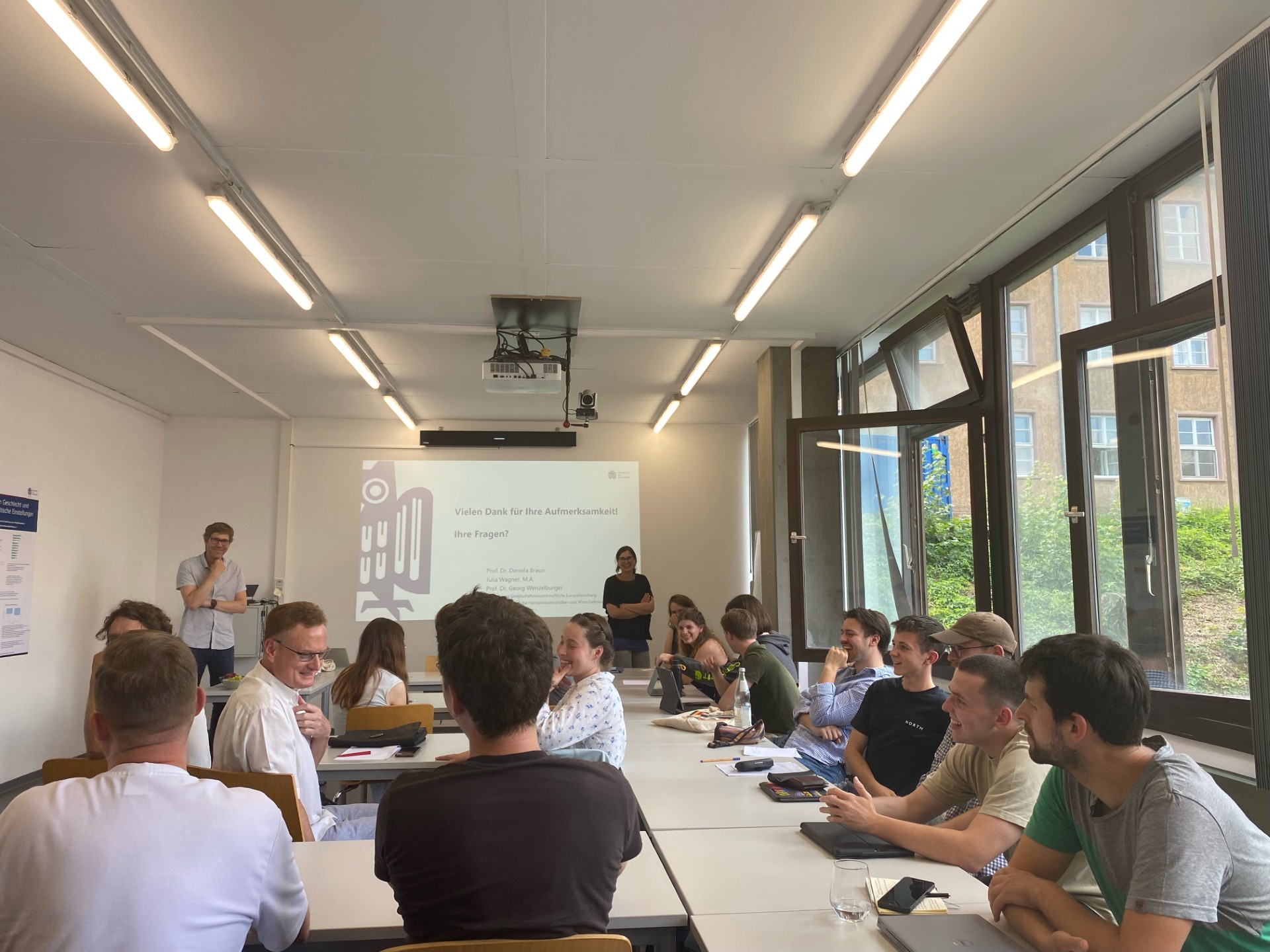
First results of Voto project published
The first results have now been published at the final discussion of the Voto project. Students from Saarland University presented these in the form of posters. For example, it emerged that even people on the left of the political spectrum can be in favour of border controls (poster) and that young people think of environmental issues as most important (poster). The influence of educational qualifications on the position (poster) (poster) and the influence of gender and age (poster) were also analysed.
Article in the Saarbrücker Zeitung

